#because Japanese syntax is so different from English syntax
Explore tagged Tumblr posts
Text
I tried translating the description for the Tartaglia perfume in the Genshin Fragrances series (the perfume collab with Primaniacs), but I’m not fluent in Japanese so there might be grammar mistakes and nuances may be lost with word choice. So y’know, please take this with a grain of salt, and feel free to correct me!
This definitely follows the Japanese version’s characterization, haha

Character: Tartaglia
Note: NSFW/suggestive, tone is slightly dark. Translation notes have a few violent example phrases

But first, the layers of notes described on the website (in English):
Top Notes: Bergamot, Eucalyptus, Green Apple
Middle Notes: Jasmine, Orange Flower, Patchouly, Cumin
Last Notes: Floral Ozone, Nutmeg, Tonka Beans, Agarwood
-
(Would that smell nice? Does that match the vibe in the description? I’m not a perfume person, so…)

Product Description
朗らかな笑みが生む危険な光
A dangerous light that gives rise to a sunny smile
心を射貫くライトフゼアノート
A heart-piercing light fougère note
きらりと輝くオレンジフラワーの躍動感に乗せて、飄々と漂うシトラスハーバル。
A citrus herbal that drifts aloofly, matching the liveliness of a glistening orange flower.
冷ややかなパチュリの闇を背後に潜ませながらも、振り返ったその横顔にはトンカビーンズの温もりが宿り、柔らかな表情を覗かせる。
Though the chilly darkness of patchouli lurks in the background, the warmth of tonka beans dwells in that profile which looks back and shows a gentle expression.
それは心地良さと不穏な気配の、不思議なコントラスト。
It’s a strange contrast between comfort and a disturbing presence.
暗と明が放つ軽快な熱に浮かされ、どこまでも翻弄されるフレグランス。
Giving off darkness and light while caught in a flash of zeal, a fragrance that puts you at his mercy completely.

If you enjoyed this, would you also like to check out how his Story Quest’s structure parallels his Character Story, how the Snezhnayan nursery rhyme is like in Chinese, and how he’s characterized in Chinese here?
——
DO PEOPLE REALLY DESCRIBE PERFUMES LIKE THIS. I understand describing the actual ingredients (?) but the rest of it is very flowery. (Update: Primaniacs seems to specialize in interpreting manga/anime/video game characters as perfumes. I read through some descriptions for their other character perfumes; this is the style they use for all of them it seems.) The first two lines sound like a shounen anime opening… but the rest is like a reader insert imagine… And what’s with that last line??
(My initial translation for the last line “暗と明が放つ軽快な熱に浮かされ、どこまでも翻弄されるフレグランス” was “A fragrance that floats between a light heat emitting darkness and light, and toys with you endlessly” but after looking the words up in Weblio I think I messed up the definitions a lot.)
We really need to look up definitions for some words here… (using definitions and examples from weblio)

朗らか (ほがらか):cheerful, bright, merry.
E.g. 朗らか微笑 (a bright smile), 朗らかに笑う (to laugh merrily)
射貫く(いぬく):to shoot through (a wall, the heart, etc.); to go through; to pierce; to hit (e.g. the bull's-eye)
躍動感(やくどうかん):energetic feeling; sense of liveliness; vigor
潜む(ひそむ):lurk (in, behind, under). E.g. 物陰に潜む (lurk in the shadows)
振り返る(ふりかえる):look/turn around; (physically) look back (at)
柔らか(やわらか):velvety (e.g. voice), tender, (physically) soft, mellow
-
—velvety?? 柔らかな表情… 表情 means expression, so, “tender expression”? “Gentle expression”? (Looks back at item description.) I feel like I’m reading a M-rated reader insert vignette.
-
心地よい(ここちよい)(adj.):comfortable; pleasant
心地良さ(ここちよさ)(noun.):comfort
不穏な(ふおんな):disquieting, unpeaceful
e.g. 不穏な犯罪 (a disturbing amount of crime), 形勢不穏なり (The outlook is grave.)
Hm.
-
And now, the last sentence:
-
放つ(はなつ): (of a light or fragrance) give out/off; send out; put forth; emit
芳香を放つ (send forth fragrance; smell sweet)
軽快な(けいかいな)(adj.):lightweight, light
e.g. 軽快な手(a facile hand), 軽快な挙動(agile/nimble movements)
熱(ねつ):heat, temperature; fever; enthusiasm
Oh, it could also mean enthusiasm?
浮かす(うかす): to float, to get up (?), to save (money), to be on the mind (??)
e.g. 熱に浮かされる(to be delirious)
Note: this is the same wording used in the perfume description
So “軽快な熱に浮かされ” isn’t “floats between a light heat” but rather something like “caught in a flash of zeal”…?
-
どこまでも: anywhere; in every point, thoroughly; persistently
e.g. 彼はどこからどこまでも武士だ (He is every inch a samurai)
e.g. あなたにどこまでもついて行く。 (I will go with you anywhere.)
e.g. どこまでも目的を変えるな. (Keep to your purpose.)
翻弄される(ほんろうされる): (for people) be made a fool of (by)
e.g. 『源氏物語』に登場する玉鬘も数奇な運命と自らの美しさが引き起こす騒動に翻弄され続けた女性である。(Tamakazura in "The Tale of Genji" is also at the mercy of her fate due to the incidents triggered by her hapless fate and beauty.)
風波に翻弄される: to be toss about by wind and waves
e.g. 船は狂瀾怒濤に翻弄された (The ship was tossed about by the ranging waters)
e.g. 船は翻弄されていた。(The ship was at the mercy of the waves.)
-
The ship examples sound way more sexual than the other example sentences on the page involving (heterosexual) humans huh
-
There’s no doubt a sexual undertone with this last sentence. “Messed with”… “endlessly”/“thoroughly”… “at the mercy of”…
-
“どこまでも翻弄されるフレグランス”
“A fragrance that toys with you endlessly”…?
“A fragrance that puts you completely at (his) mercy”?
“A fragrance that makes you completely submerged in him”?
using “submerged” to evoke the image of waves and water
But, that’s probably not the intention of the product description, and I’m just having fun here

“暗と明が放つ軽快な熱に浮かされ”…
“A fragrance that gives off darkness and light, caught in a flash of zeal”…
…“どこまでも翻弄されるフレグランス。”
…“and puts you at his mercy completely”…?
-
“Giving off darkness and light while caught in a flash of zeal, a fragrance that puts you at his mercy completely.”
-
(Putting this together is.. oh my, lmao. That is about the most erotic perfume description I’ve ever read, and for Tartaglia of all characters🤣 I’d like to imagine this as a battle, but that doesn’t work for him either—in the Chinese version.)
#HOW DID IT END UP LIKE THIS#I went in trying to see what flowery metaphors the Tartaglia perfume uses#but it’s basically a reader insert/imagine smut fic#WHAT IS GOING ON#but this certainly was an interesting experience translation wise#because Japanese syntax is so different from English syntax#even though I understood the meaning of the words it took some effort trying to convey it in English#in a cohesive way#Genshin translation#Genshin fragrances#Childe#tartaglia#dusk analysis#Genshin impact#genshin smut#dom childe#dom Tartaglia#I guess#genshin imagines#tartaglia x reader#tartaglia x you#…I guess
40 notes
·
View notes
Text
extremely rare writing blog reblog here but on paragraphing i always think about the old tiptop post that circulated around tumblr a while back. for those that have never seen it, tiptop stands for time, place topic, person. these are practical ways to split paragraphs, but also, that last one is especially important for how dialogue reads. standard formatting is useful in that regard.
also, paragraphing (in my experience) has a similar purpose to syntax diversity in that they're about how a piece Flows(tm). all different elements of what you do when writing can affect flow, as well as tone and mood. but on a basic level, syntax and paragraphing are peas in a pod. what you put where, and how you break it up, will always affect how an audience absorbs information.
that said, i want to highlight that you can still learn important skills from employing techniques inspired by other mediums. obviously they shouldn't be the only thing you use, but there's a reason a lot of creative writing programs will make you study more than just your focus (the MFA i'm looking at makes you do that, and my undergrad degree did as well). learning from other mediums of writing helps us innovate with the way we use language.
do i think books should be written like movies? nah, not really. but while i was looking for the tiptop post to make sure i quoted it right, i saw another post i reblogged about paragraphing that talked about people wanting to capture the feelings that movies invoked in them.
(hell, it's literally the last post we reblogged here)
studying elements of the stories we like can help us learn how to elevate our craft. for my money, i've learned a lot about paragraphing by working on personal comics (and more comic-oriented people than i have noticed that paneling and paragraphing are far from entirely divorced concepts). thinking about what i want a reader to see versus what i want them to know has been a lot of fun as i've gotten back into writing recently. but that's less related to paragraphing and more just me trying to develop "show and tell" techniques (in this case, showing one thing while a character is telling another).
that was kind of a tangent. anyways.
at the end of the day, paragraphing is, like many other elements of writing, a stylistic thing. it's going to vary from writer to writer, and for people building a style of their own, you'll really need to pull from more than just visual media if you're writing something not intended to be visual.
if you want to write film scripts, do it! but understand that you'll be severely limiting yourself if you only sup your style on the way film crafts stories.
i think people who complain about paragraphs being too long should just read/write screenplays instead. some of us actually enjoy reading
#technical stuff#rook rambles#for the record i completely agree with op's points here; i'm just in an analytical mood because it's grad app season#i don't imagine anyone will actually see this reblog but i am thinking about paragraphing *specifically* a lot right now#because i'm doing a fan edit of the official translation of one of the digimon webnovels#paragraphing in japanese is very different from what i can tell ime reading not just official translations#but the unofficial ones#and both syntax and paragraphing structures end up very strange when translated into english and unedited#that's part of translation theory tbf but it's been a really interesting exercise so far#i'm fixing mostly tense inconsistencies and tiptop level “basic paragraphing” shit#but i'm thinking about also going more in-depth with the edits to try to make it read more naturally without changing the message#-sky
11K notes
·
View notes
Text
ES21 japanese volumes - part 1/??
part 2 >>
Sooooo I recently got my hands on the complete Eyeshield 21 manga series in Japanese and as someone who's only ever read the story through fan-translations on dodgy websites online, I wanted to go through and "live" blog about it, so to speak. I thought it would be interesting to see the changes between the languages and where the fan-translations likely fail with mistranslations. (No shade btw, I think fan-translations are great both as a hobby and the fact that they're doing their work for free, but it's also a reality that the vast majority of fan-translators are amateurs, many of whom don't fluently speak the language they're translating, so there's bound to be mistakes!) Also, I wanna know what they're originally saying because I’m nosey <3
I know the official English translation by VIS is allegedly pretty decent, bar the toning down of some things (like Hiruma's language lol) so if you've had the chance to read the official version, feel free to chime in on differences with the fan-translation that I'll be referencing, or potential differences between the Japanese version too!
And finally, while I am half Japanese and grew up there, tragically my language skills are imperfect. I speak it, but my vocabulary isn't very robust, so I do look up the definitions for a lot of words and kanji, as well as more nuanced connotations or references that may go over my head. Bilingual problems <3 But again, it's good practice for me and I think it'll be kind of fun!
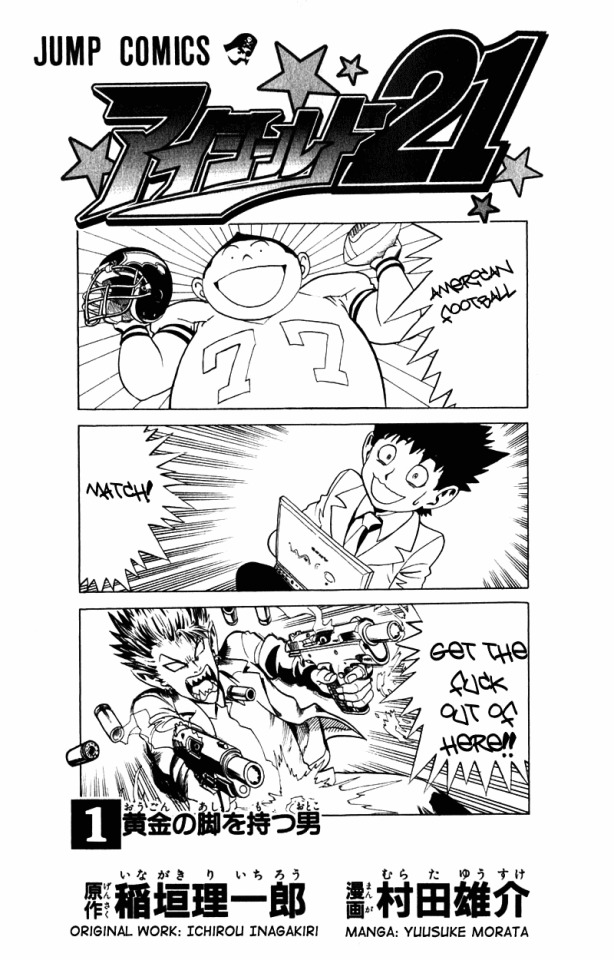
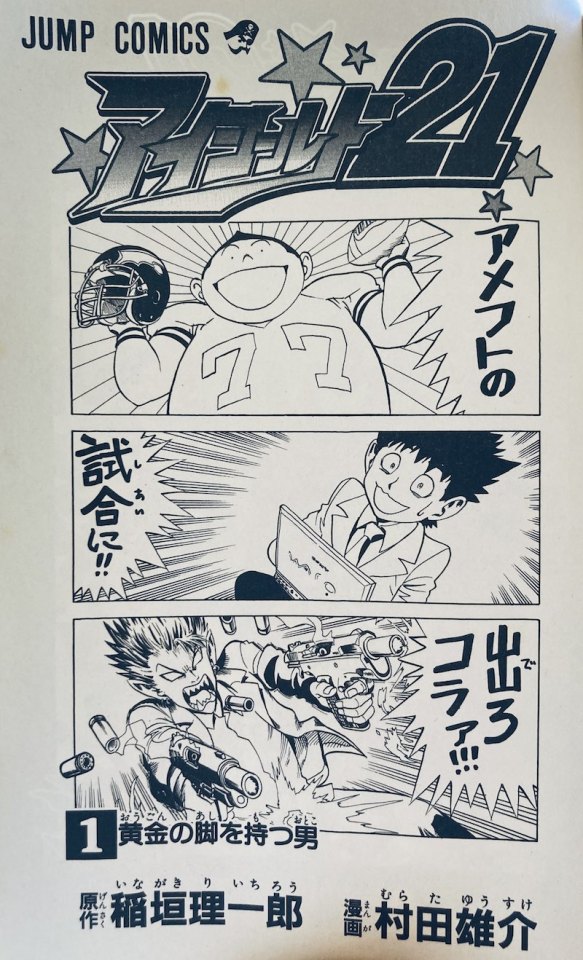
Right off the bat, this page. What it’s saying is essentially, “You better come out and play (in the) American Football match!” But because Japanese syntax is different from English, it’s structured like “American Football Match you better play!!” The translator was confused by the final line, because in Japanese a way to say ‘participating in a match’ is by using 出る which means to ‘go out’— sort of like ‘go out (into) the match’. Maybe a better option would have been ‘get the fuck out and play!!” or just “you better fucking play!!”. It still keeps the overall sentence structure which sounds awkward in English, but at least it gets the meaning across.
(I’m not gonna get into every little mistranslation btw, because that would take forever, but I felt that was a good way to explain how frequently there are little mistakes like this.)
Putting the rest under a cut because I imagine this will get long
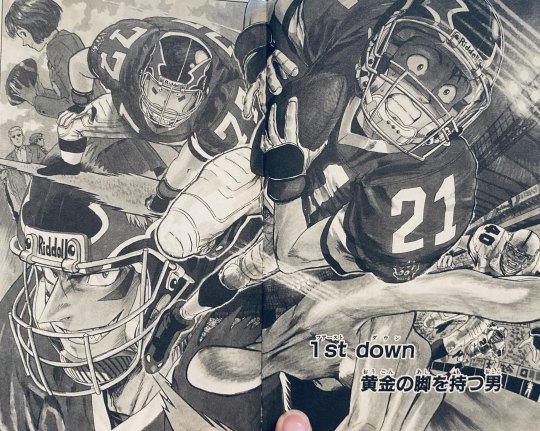
Look at our boy <3 So as you know, we start our story with Sena Kobayakawa timidly seeing if he passed his high school entrance exam into Deimon High School, with his childhood friend/older sister figure, Mamori Anezaki lending moral support.
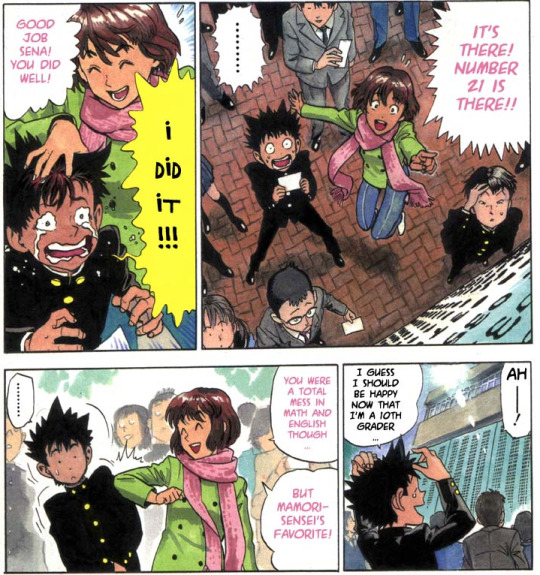
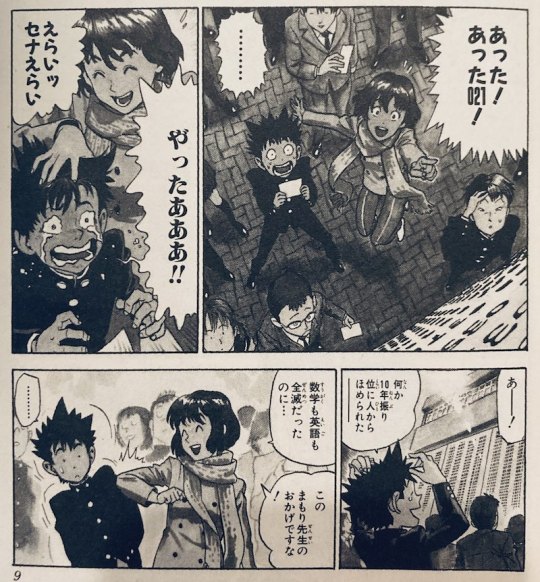
In the third panel, what Sena says is actually “I feel like I’ve been praised for the first time in 10 years—” (maybe they changed it because that was too pathetic 😭) Then in the fourth panel, what Mamori says is more along the lines of “And to think you were a total mess in math and English… It’s all thanks to Mamori-sensei!”
Also I want to point out that Mamori is a little cheekier in the first few chapters. Like obviously still kind and nurturing in personality (her name is literally ‘to protect’), but she teases Sena and feels more like an older sister than like, an overprotective mom lol. Miss that for her 😔
Then along comes our kind senpai to accost our clueless protag...
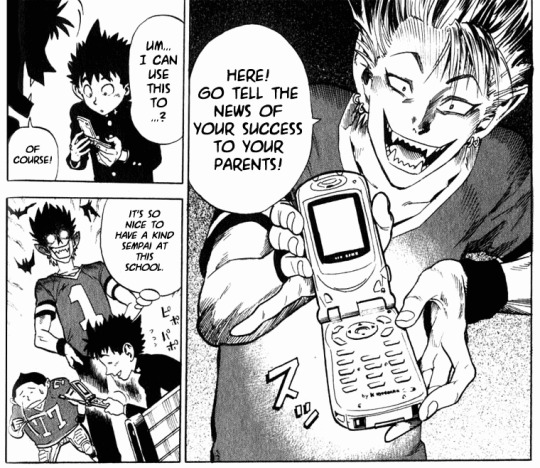
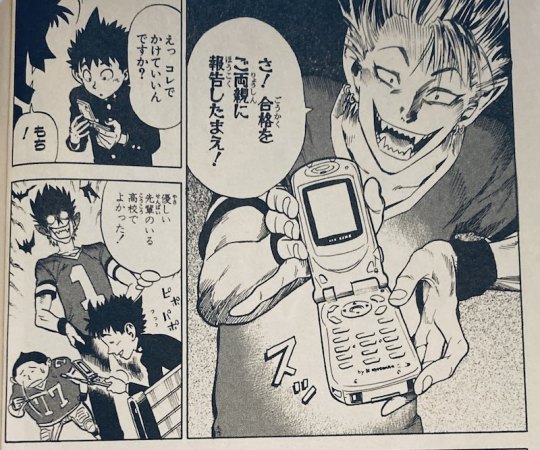
There’s no mistranslation, but I just wanted to mention that the way Hiruma talks in Japanese is so funny? Like in panel 1, he’s speaking with a dramatic affect, he sounds like some sort of npc in a jrpg giving the protag a quest. And then in panel 2, his ‘of course!’ is this shortened, slang version of the word that sounds almost cute and very modern after the previous line. Hiruma uses a lot of slang in general, though I can’t say if any of it is like, common or used by teenagers (of the time, anyway) or if it’s just Hiruma-isms.
(Look at Kurita doing the sign of the cross in panel 3 😂)
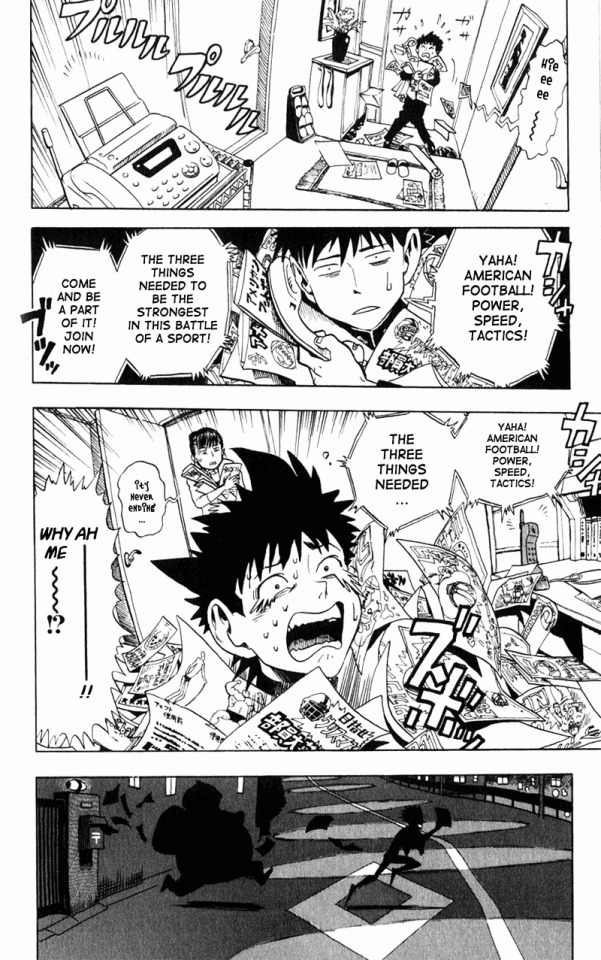
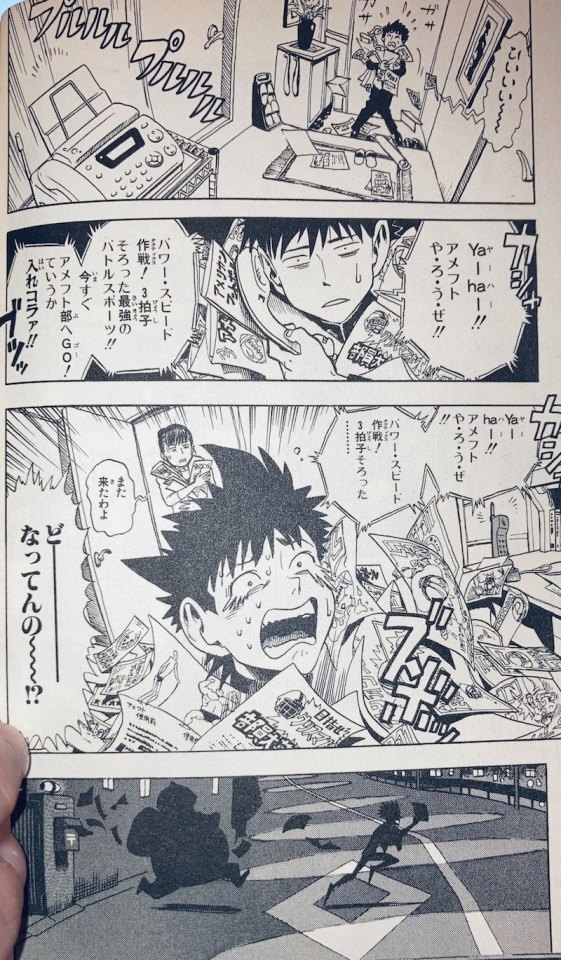
I can’t believe Hiruma managed to physically emulate the experience of contracting some shady internet virus…..
Something that’s done with Hiruma’s dialogue a lot (it’s done w/ other characters too, but most often with Hiruma) is where there’ll be a word/term in kanji that means one thing and pronounced in a certain way, but then the furigana (so the phonetic pronounciation, basically) next to it says something different. Now, in some stories (like Berserk for my pals out there), this is used to create poignant, layered meanings in the text. In ES21 however, it’s mostly used for sports manga flavor. For example, in the above page in Hiruma’s spam fax message, he uses the word 作戦, which means tactics or strategy, and is pronounced: “sa - ku - se - nn” さ-く-せ-ん. But the furigana next to that word reads タクティクス which is quite literally just the English word ‘tactics’ spelled phonetically in Japanese lol (aka a loanword).
He does this A LOT, most frequently with sports terminology, where the kanji are pretty dense, technical terms, and the furigana a loanword version of the same meaning. (though now that I think about it, it might also be because while パワー (power) and スピード (speed) are frequently used and well known loanwords to the average Japanese person, タクティクス (tactics) might be more obscure, so the kanji is there to like, clarify the meaning? 🤔)
Also I love all the early 2000’s tech we see in the early chapters— flip phones and fax machines galore! Even within the later segments of the series, the flip phones start to magically get more advanced, but in my heart ES21 takes place in like, 2003. If they ever do a remake of the anime (which is unlikely to say the least) I’d want them to maintain the early 00’s vibes. It just wouldn’t be the same if everyone had smart phones.
Skipping ahead a few pages, I remember this bit never really made sense, but I got enough of the general gist that I kind of shrugged and moved along. But!! the translation is just making stuff up here?
So for context: it’s Sena’s first day at Deimon, and Mamori (who’s a grade above him) advises him to make proper friends this year, since he has a history of only ‘hanging out’ with shitty bullies who used him as an errand boy.
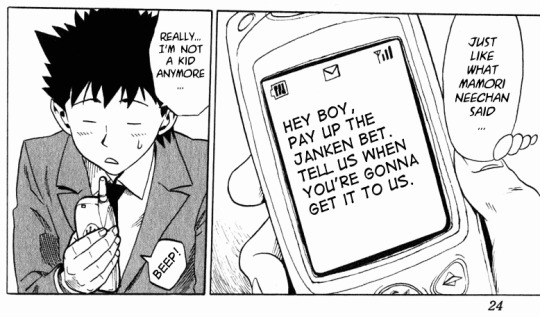
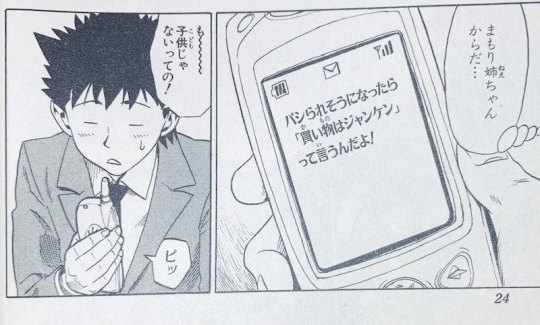
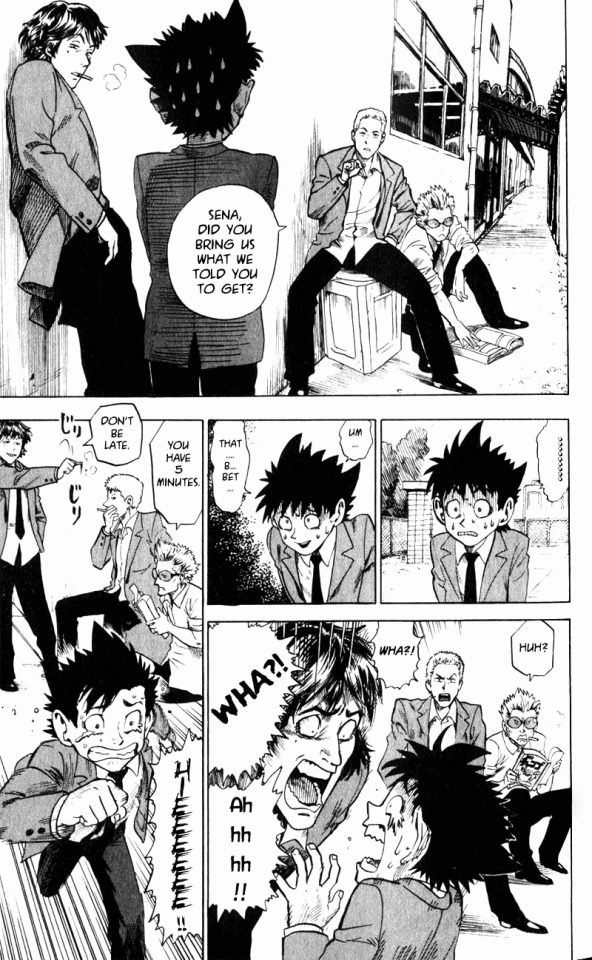
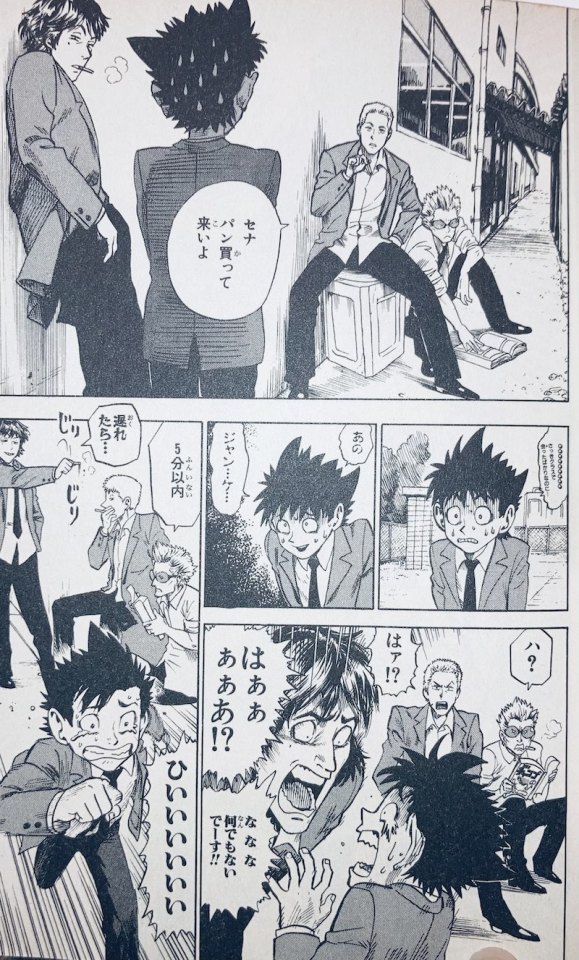
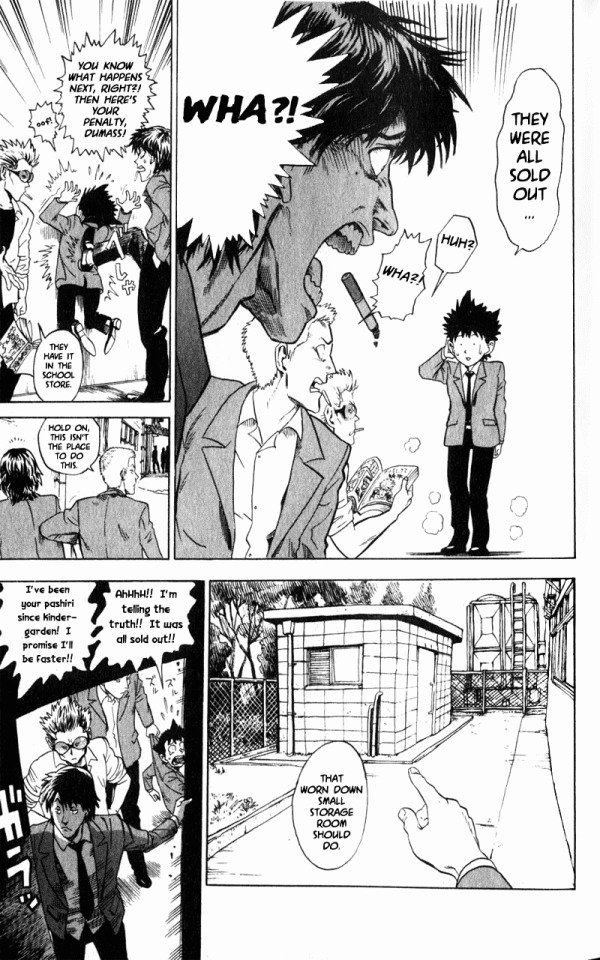
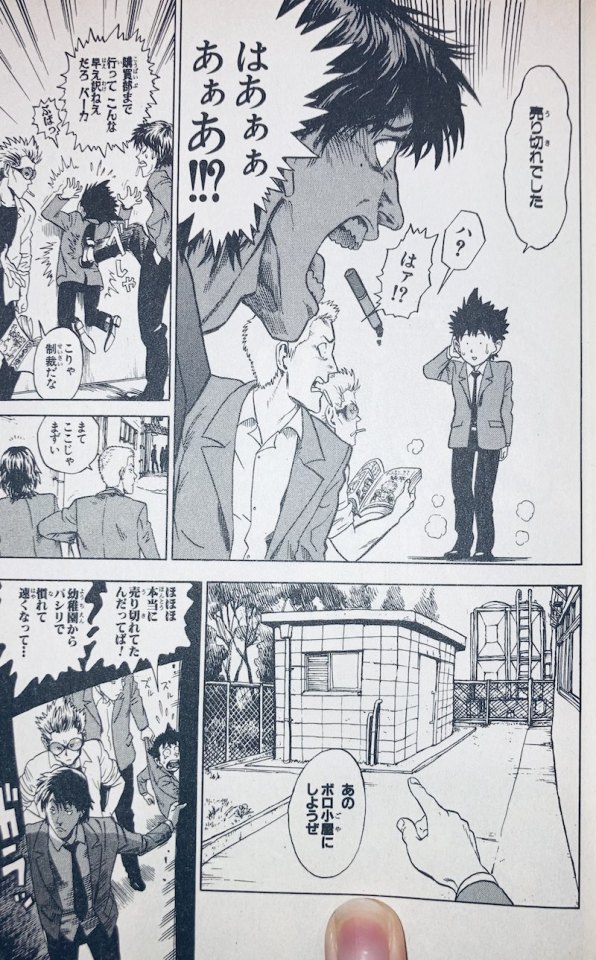
In the English translation, Sena seems to get a text from a mystery number, telling him to pay up for a bet we never saw happening. He goes to meet up with the texter, who we assume at this point is a previous aquaintence, since he had Sena's number? Maybe one of those bullies that Sena hung out with from middle school? They make Sena go and get them an unspecified thing, but because Sena ran there and back so quickly, they don't believe that Sena actually went, and is lying when he says they were sold out. They drag Sena to a small shed to beat him up, and in the last panel of the third page, Sena says that he's been their errand boy since kindergarden?
So for a number of years I was under the impression that the Ha-ha brothers knew Sena from before the series, even though that never seemed to come up in the rest of the story.
But in the original version, Sena is actually getting a text from Mamori-- which makes sense because it was established earlier that his cell phone is brand new and he only has Mamori's number in his contacts. Mamori's text says: "If someone tries to make you run their errands, tell them 'let's decide by rock-paper-scissors!'" Sena is understandably kind of embarrassed by this, and mutters to himself that he's not a kid anymore.
Then it cuts to Sena being picked on to be an errand boy lmao. Presumably this is because Sena just looks like an easy target to bullies, not because of any previous aquaintence rip. The blond bully tells Sena to go buy them bread (which might sound weird, but Japan has a lot of tasty snack breads that they sell everywhere). In panels 2+3 of the second page, Sena timidly tries to bring up the rock-paper-scissors thing, but is intimidated into giving up and just doing what he's told.
Again, they don't believe that Sena actually went all the way to the school store and back with how quick he was, so they decide to beat him up in the shed. As he's being dragged, Sena says, "It really was sold out! I've gotten used to being an errand boy since kindergarden, so I've just gotten fast--!"
So yeah, if there were any other people who've only read fan-translations and were confused by this bit, there you go.
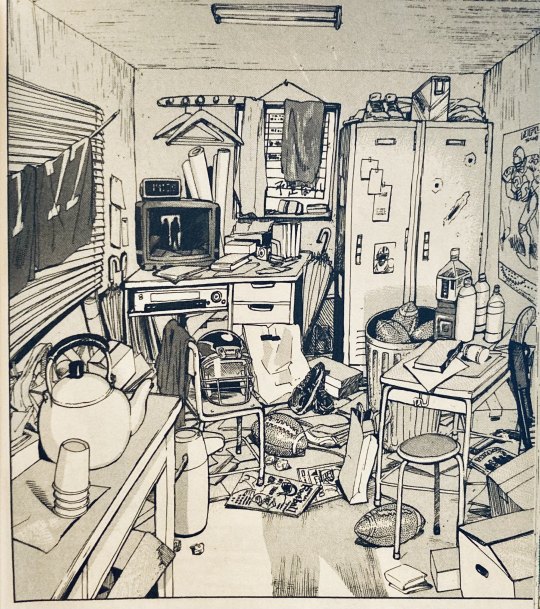
oh you just know it smelled like ass in here.....
(I never noticed the shotgun propped against the desk on the right before lol, idk why I'm surprised, but Hiruma really just left his Actual Guns lying around huh?)
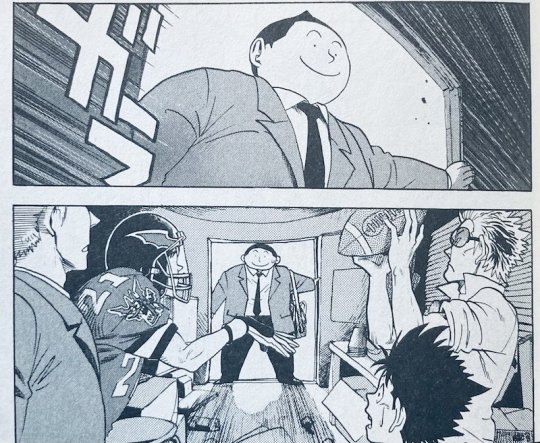
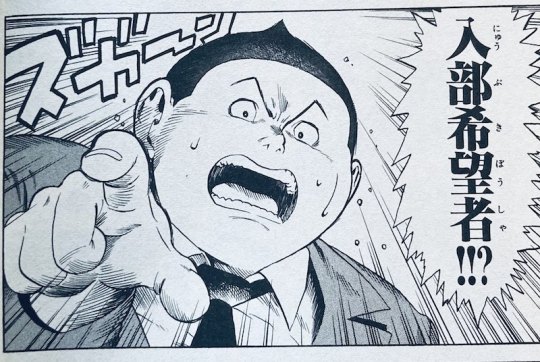
(2nd pic - Kurita: "New club applicants!!?")
There he is!! Our boy Kurita!! I do miss when he occassionally had like, more human features lol. As much as I love his big ol' smiley face, it does rub me the wrong way when the fat characters (because Komusubi falls into this too) are the only ones with anpanman faces.
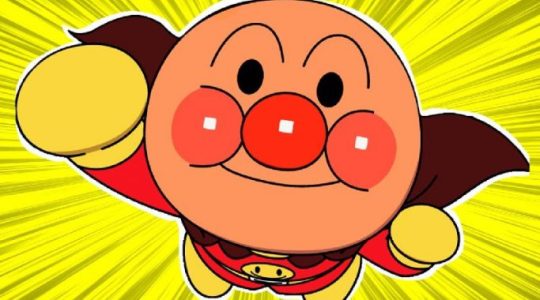
(anpanman, for the uninitiated)
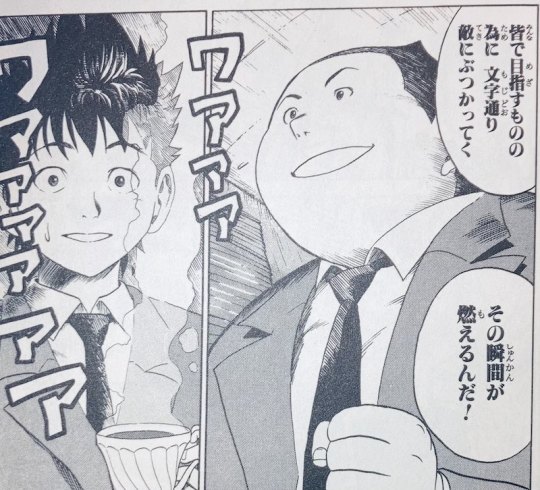
(Kurita: "To literally clash with the opponent in order to pursue a goal together with everyone-- that moment is exhilerating!")
Aw look at Sena feeling inspired! Honestly I really love how Kurita is Sena's first friend he makes in the series, and that vibe in the early chapters where it's just Sena, Kurita and Hiruma is so much fun <3
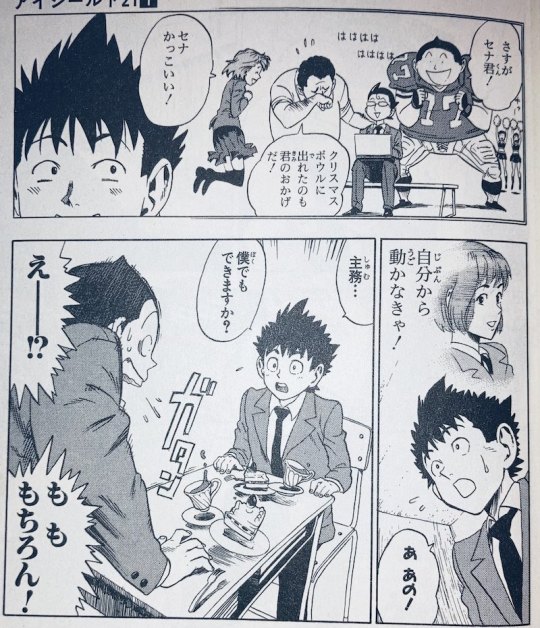
(P1: Kurita: "Way to go Sena!" Imaginary Coach: "It's thanks to you that we could participate in the Christmas Bowl!" Mamori: "You're so cool Sena!"
P2: Mamori: "You have to make the first move!" Sena: "U-um!"
P3: Sena: "Can I... be the team shumu*?" Kurita: "WHAAATT!? O-OF-OF COURSE!")
*Ok soooo I don't fully understand what a shumu is lol, or how you'd translate it to English. The word itself apparently means 'person in charge' so? The fan-translation just calls it the manager, but based on something Hiruma says later, I get the impression that the shumu and the manager are technically different roles? But when Mamori becomes the manager later, she takes on a lot of what are allegedly 'shumu tasks', along with Hiruma, so idk. If anyone's read the official VIS translation, feel free to chime in on how they did it, because I'd be curious to know!
That being said, adorable of Sena to think he could have handled that responsiblity at all 😂 our boy has many talents, but being smart and organized is not among them.
Ok fun feelings are over, it's time for pain.
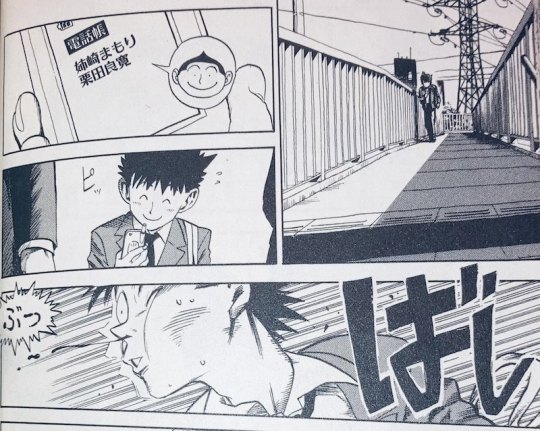
(Sena looking at his contact list, having just added Kurita's number, then wham D: )
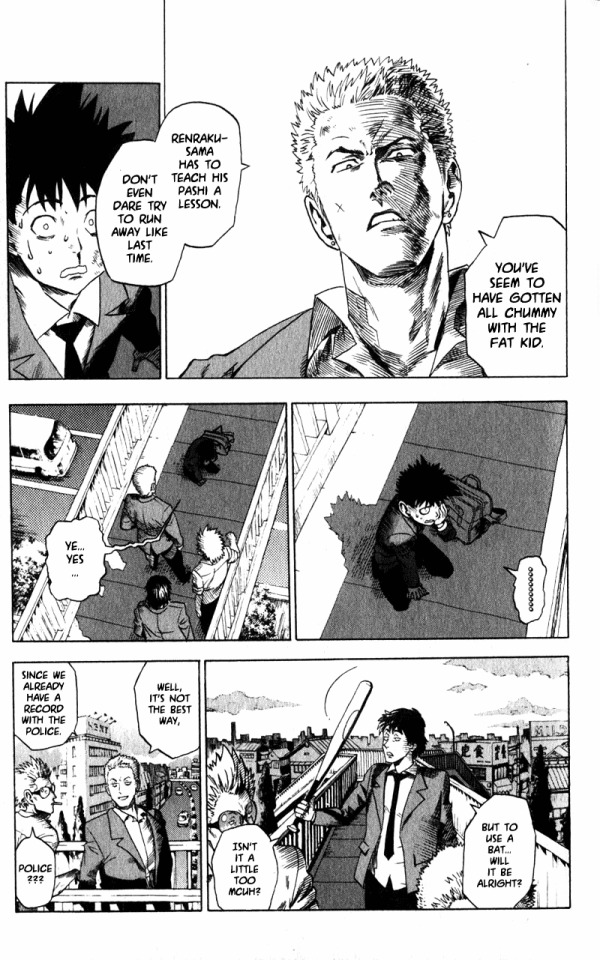
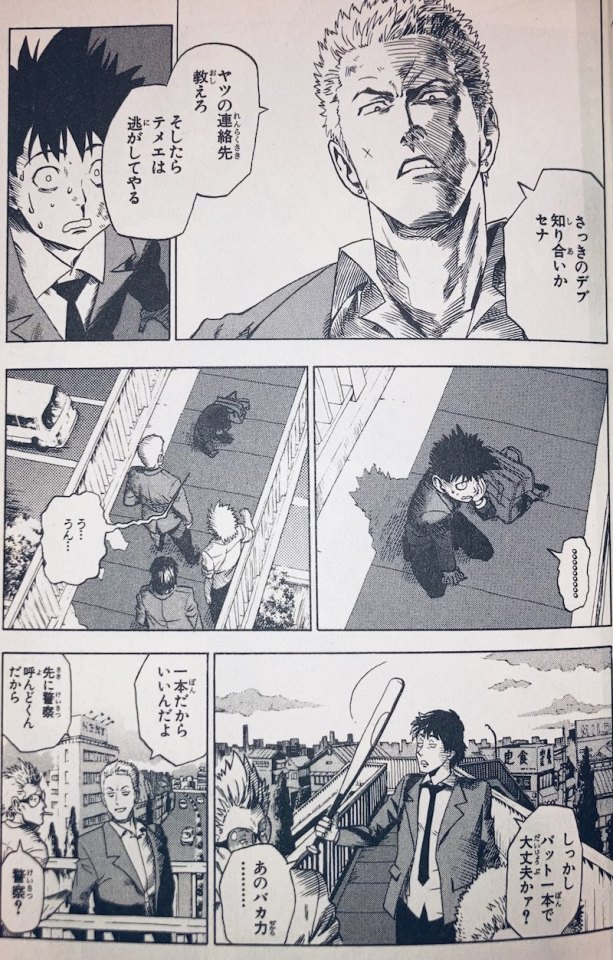
The three bullies from before were waiting to get revenge. The dialogue is a bit different in the original. Juumonji (the blond one) actually says: "That fatso a friend of yours, Sena? Tell me his contact info-- if you do that, we'll let you go." To which Sena timidly and reluctantly agrees. Then Kuroki (the dark haired one) says: "But do you think one bat will be enough? With that brute strength..." In the final panel, Juumonji says: "It's better with just one, since we're gonna call the police beforehand." Togano (with the glasses): "The police?"
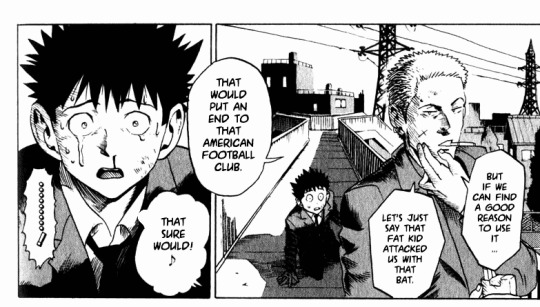
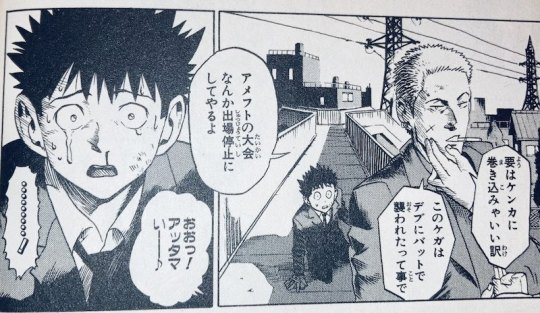
Juumonji: "As long as we get him wrapped up in the fight, it'll be fine. We'll say we got these wounds from being assaulted by the fatso with the bat -- We'll get him disqualified from the American Football tournament." One of the others: "Ooohh, smart!"
I guess the overall sentiment isn't that different, but knowing that the initial demand was for Sena to hand over Kurita's contact info with the promise that they would spare him if he obeyed-- and that at first he agreed-- makes his change of heart feel even more significant.
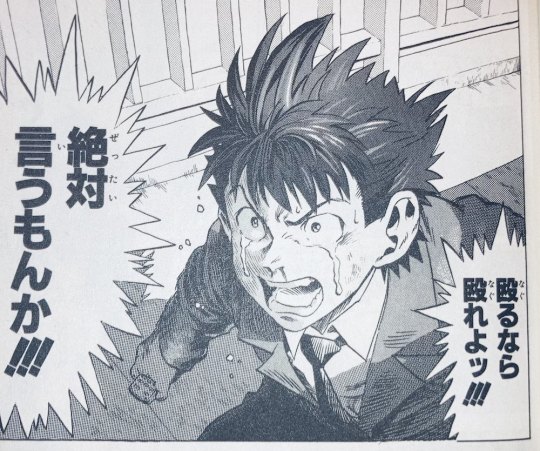
(Sena: "IF YOU'RE GONNA HIT ME, THEN HIT ME!!! I'LL NEVER TELL YOU (Kurita's info)!!!")
Tell 'em Sena!! A part of me sort of wishes the story maintained this serious story beat instead of undercutting it with humor in the next panel (not shown here) but at the same time, ES21 is overall a more lighthearted, comedic story which I love it for, so I don't think I'd like it getting too angsty. I'll always have Berserk in my corner if I want some actual angst lol.
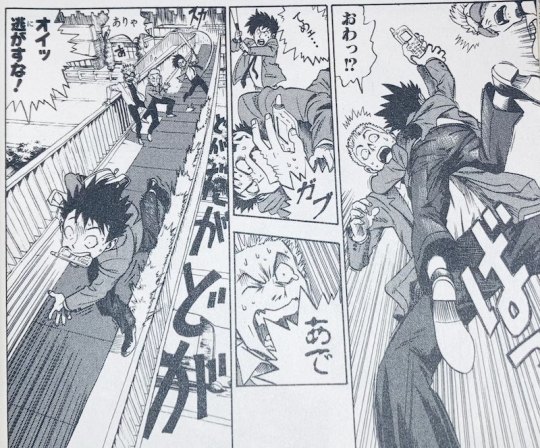
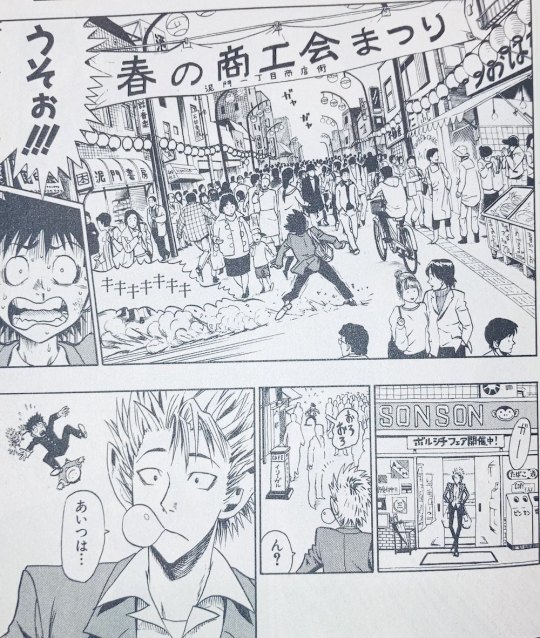
(1st pic: various sounds of surprise or pain, and in the last panel: "Oi, don't let him get away!"
2nd pic: Sena -- "No way!!!" Hiruma: "Hm? Oh it's that guy" )
Lol I do love the little details Murata included, like Kuroki taking a swing at Sena as he's biting Juumonji's hand but then totally missing in the fourth panel because Sena's so fast. Also I'm always on the lookout for the kinds of stuff Hiruma buys, snack wise. We know he loves sugarless gum, obv, and drinks coke based on that one time he bought some for himself, Kurita & Sena, but what else are in those bags? I want to know!!
--------
And lol apparently I'm only allowed 30 images per post rip, so I guess I'll end this here. I guess I can.... reblog and continue? Or I might just make another post for the next part 🤔 Besides this got way too long, so I'll have to be more brief in future posts lol.
I'm honestly not expecting more than like, five people to interact with this lol, but if anyone is interested in specific points of the story they want me to look at, please feel free to ask!
#eyeshield 21#es21#yeah this is not meta it's just.... stream of consciousness#as i ramble about eyeshield lmfao#and japanese practice that I'm inflicting on others#eyeshield 21 japanese readalong#is what i'm gonna tag it for my own sake#i guess#excuse any typos. *gun emoji* you didn't see any
80 notes
·
View notes
Note
Heeey Raven! Just for the Sillies and funsies, did you when you first started the game had a difficult time pronouncing some of the names in the game? :'D
I first started the game in late 2022, so i joined the fandom a bit late, but let me tell you, i had a hard time pronouncing some of the dorm names! Like some of the dorm names that I had a difficult time pronouncing were Pomefiore, Heartslabuyl, Diasomnia, and ESPECIALLY ignihyde and i'm going to be honest i still have problems pronouncing some the dorm names once in a while! 💀
Like i pronounce Pomefiore "Pom-fi-or" (Weirdly enough at the beginning, i pronounced Pomefiore automatically with an "r" as in "Porm-fi-or.) Another example would be with Octavinelle my brain keeps thinking that it's "octovinelle" with an "o" instead of an "a" because i think of OCTOpus when i pronounce Octavinelle! I've also seen some fans pronouncing Octavinelle "oct-tine-ville" or "Octaville," which i think is really funny cuz no one can pronounce it! It's chaotic. 😂
Some goes for Mostro Lounge, i mentally added “n” to Mostro Lounge at the beginning of the game. I used to say Monstro Lounge until I realised that's wrong! 😭
then there's Heartslabuyl! dear fricking god! What a tongue twist! 😭 I used to pronounce and still do heartslabyul "heartzabyul." I don't know how accurate that is, but it's such a mouthful. 🫠
AND The ONE dorm i had the MOST trouble pronouncing was Ignihyde! 💀 and still can't do it right! Again, I've seen some fans pronouncing it "Ichigyde", "igh-knee-hide" or "Igunihaide".
Also, i keep reading Diasomnia as in Diasmonia, I don't know why, but it's automatically DiasMONIA in my head.
This all some weird Mandela effect! 💀
anyway i was actually going to mention some other funny things i misspelt or mistook something in the game when i first started, but this got so long that i'll just end it here and send another ask another day til then See ya! ✌🏻

I've never really had an issue with the unique names that come up in TWST! Everyone's going to be biased to their own ways of pronouncing the words, but personally I find it helps to break things down into smaller bits. I think I didn't have trouble with the dorm names because of this. If you slow down and take your time with them, it's not so hard. For example, I guessed "Pomefiore" must be said as "Pom-eh-fee-or-ay" because "pomme" means apple in French and "fiore" means flower in Italian. Likewise, the "somn" in "Diasomnia" refers to "somnus" in Lain, which means sleep.
Some of the variations in pronunciation naturally occur because the way things are said in Japanese is different than in English. For example, "Ignihyde" is said "Igunihaide" in Japanese, whereas in conventional English is it said as "Igh-knee-hide". Some people will choose to say it the Japanese way, others will say it in the conventional English way, and some will do it another way entirely. (I also want to point out that some words just sound plain awkward to say in English due to differences in what is considered "normal" grammar and syntax from language to language. "Octavinelle" said out loud is such a mouthful in English because we usually don't see this combination of letters.)
I try to not get caught up on whether or not I'm saying the names of new terms (character names, dorm names, etc.) "correctly" or not, because there is sure to be differences anyway, whether between languages or between individual dialects. (I talk about that more in this post!)
P.S. The "Monstro"/"Mostro" Lounge confusion was probably the most common mistake! That comes from a lot of fans assuming that the lounge must be named "Monstro" after the whale in Pinocchio.
#twisted wonderland#twst#disney twisted wonderland#twst en#twisted wonderland en#notes from the writing raven#question#Pinocchio
58 notes
·
View notes
Note
Random Komaeda questions from an English DR fanfic writer: I don't speak any Japanese, but when I played DR with my friends, we played with the Japanese voices and English subtitles. I'm very fond of Megumi Ogata's performance as Komaeda, and I'd like to write Komaeda in a way that reminds people of that performance! All of this makes me very curious: How does Komaeda speak in Japanese? Does he use formal vocabulary? Casual? I noticed that a lot of English fanfics tend to write him (on purpose) as sounding a bit "too formal", like someone who reads a lot of old books more often than he speaks to others. I heard that in Japanese, he speaks in more of a polite-casual sort of way, and that he slurs his words together a bit. Does he talk like a "normal guy" when he's not doing one of his hope rants? Does he sound "cool"? Does he sound a bit "childish"? I've heard all sorts of things. XD
Wow, this is a very interesting question! XD
Megumi Ogata's performance as Komaeda is definitely great. I really love it too! According to Rui Komatsuzaki's comment in the art book of Danganronpa 1・2 Reload, he adjusted the facial expressions of Komaeda's sprites many times based on Megumi Ogata's performance, so it is inevitable that Megumi Ogata's performance is very suitable for him. By the way, I might have an idea why Komaeda's speaking style in the English fanfics tends to be too formal. He talks very differently depending on who he is talking to, so it is hard to generalize, but basically he talks to other Ultimate students, so he gives too much praise because he respects those who have great talents, and he is very modest about himself to show respect for others. So I think that results in a more formal way of speaking in English.
His way of speaking is... um, yeah. Casual. I don't think it's cool. Sometimes it's childish. But it really depends on which scene you base it on, so it's hard to say in a nutshell 😣 I have my own personal standard for his way of speaking, which I call "狛枝構文 (Komaeda Syntax)". ---------------------- His way of saying YES: 日本語 -> 「もちろんボクが断るわけないよ。」 English -> "Of course I wouldn't say no."
His way of saying NO: 日本語 -> 「ボクは遠慮しておくよ。」 English -> "I'll be reserved about it."
----------------------
Can you see what I mean? His way of speaking is circuitous! XD
32 notes
·
View notes
Text
Tecchou vs Tetchou: on spelling and romanization
Have you ever wondered why the official English manga uses "Tetchou"? And official merch from Japan "Tecchou"? Why is the fandom so split on spelling? What is correct?
I'm hoping to answer some questions here :)
[Tl;dr at the very end]
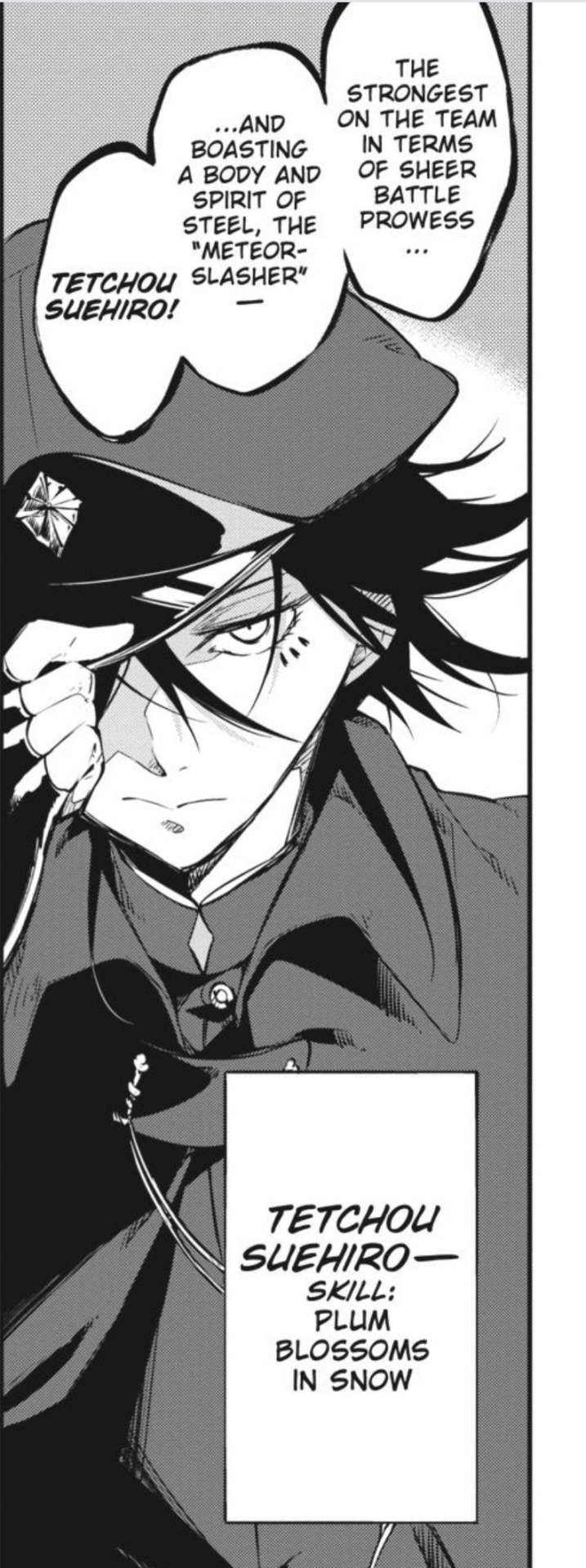


Please note: I'm not a native Japanese speaker. I am, however, a linguist. I've dealt with Japanese linguistics (everything from spelling and syntax to phonology) on an academic level and I'm actively learning Japanese at university. Okay? Okay. Then let's dive into this!
1) Romanization?
Romanization is the act of translating Japanese words that are originally in kana/kanji into the Latin alphabet. The romanization that's mostly used (in English manga & anime) is the Hepburn romanization. It's based on English spelling and pronunciation!
This mostly goes for consonants, meaning the J in Jouno is pronounced like the J in Jungle. Vowels are a bit different but we won't get into that now. Important is: based on English spelling and pronunciation.
2) The っち in Tet/cchou?
てっちょう
-> Te "sokuon" chi "yōon" u
Let's break it down: the first hiragana is a small tsu っ (called sokuon). It makes the following consonant, in this case, the ch of chi ち longer. Usually, it simply doubles the consonant in writing:
っこ -> kko
っし -> sshi
But for っち, according to Hepburn, not cch is used. But tch. Why? ...🤷♂️ (the actual explanation given on Wikipedia is "because the perceived consonant that's doubled is [t]" but then why is the s of shi doubled, and not shsh? But I digress...)
If you're not familiar with this specific rule, it wouldn't occur to you to use tch and not cch! Because it usually doubles the written consonant!
According to strict Hepburn romanization, Tetchou is more correct:

But there's more!
3) Tetchō? (A small detour on ou vs ō)
According to Hepburn, vowels presented in Hiragana (as in ちょう chou) can be translated separately as ou, or using ō. There are more variations of this that are correct. But these are the most common ones.
But then... wouldn't Tecchou be wrong? Well...
4) Spelling (and fandom)
As I mentioned, the spelling is based on English pronunciation. tch and cch are the same in that sense. You would pronounce them the exact same way. And, as mentioned, cch is the more intuitive translation. Japanese publications use it. Fans use it. And that's okay!
Fans have always chosen spellings selectively. When did you last read Gojou instead of Gojo? Chousou instead of Choso? Both are more "correct" according to the Hepburn used.
Essentially, it doesn't matter if people use Tetchou/Tecchou/Tetchō or any variant. As long as you don't use Techou. Because that means notebook (てちょう). Don't do that. The っ does very much make a distinction in meaning here and must be translated one way or another.
5) Romanization and linguistics
Japanese linguists (those who speak Japanese natively and write about Japanese) often write their academic papers in English. They tend to use different romanization methods depending on the paper. And they're inconsistent as hell.
You can read a paper on Japanese morpho-syntax and a word can be transcribed a certain way on one page, then in a slightly different way on the next!
This is just to put into perspective that romanization is simply a tool that people tend to use however they want. Even scholars!
As long as the meaning doesn't get lost, cch vs tch doesn't matter that much. Again, Japanese publications use cch! English ones use tch. It's okay!
There are cases where it matters for the distinction of meaning!!! But Tecchou vs Tetchou isn't one of them.
Tl;dr:
According to strict Hepburn romanization, Tetchou is correct. But Tecchou is a more intuitive translation when you follow most Hepburn rules except for this special one, which is why lots of people and Japanese publishers use cch. The double consonant tch/cch is a meaning distinction from other words, so it must be used. But which one you use doesn't really matter, it has the same outcome.
#bsd#bungou stray dogs#bungo stray dogs#tecchou#tecchou bsd#tecchou suehiro#bsd tetchou#tetchou suehiro#tetchou#my posts
38 notes
·
View notes
Text
Pre-translation text analysis and language learning
based on Katherina Reiss’ and Christine Nord’s translation theories
I had always regarded science as a universal and believed there are no differences in science at all between countries. But I was wrong. People with different cultures think in different ways, and therefore their science also may well be different. (Motokawa 1989, p. 489)
This quote resonates with me a lot! It highlights the impact of culture on our use of language; how we express ideas and document them. Being aware of the variations in styles—whether in writing or speaking—and genres can significantly accelerate the learning journey, enabling us to acquire a more authentic command of English or any other language we're studying.
This post will guide you on how to compare two languages, including where to begin and what details to consider.
Pre-translation text analysis
Pre-translation text analysis involves examining the source text before translating it to ensure accuracy, clarity, and consistency. This process helps identify potential issues such as ambiguous terms, cultural references, technical jargon, or complex sentence structures. Such analysis can help translators produce a more accurate and contextually appropriate translation.
In simple words, you pinpoint characteristic features of a text.
I already made such an analysis in this post - I analyzed the Japanese writing style and tried to determine how it differs from the English style.
More on that here
How will that help me learn a language then?
In short, it will help you:
Improve your understanding of the target language. By that, I mean identifying grammar points, difficult or unusual vocabulary, or complex sentence structures.
Identify challenges. Once you’re done analyzing the language layer, you can highlight challenging points, allowing yourself to focus on specific language challenges.
Build cultural awareness. It helps recognize cultural nuances in the text, which improves the ability to use language in context.
How do I start such an analysis?
According to Katherina Reiss and Christine Nord, German linguists and translators, you can start off with determining:
extralinguistic factors of a text.
intralinguistic factors of a text.
Extra means that something “comes from the outside” and linguistic refers to language. You’re looking for features that aren’t related to the language itself (elements from outside the text). This means that you want to determine:
Function. What is the text trying to say/convey? Authors have intentions. Texts are written for a reason. What is the text’s function in its source culture? To inform, to evoke emotions, to educate, to entertain?
The recipient. Who is the target reader/audience? Doctors, teenagers, politicians? Depending on the target audience, the language will differ as well (different vocabulary, syntax, register, and so on).
Time and place of reception/publication. It might seem unimportant, but if the text was published 30 years ago, it would give a rough idea about the language conventions and standards prevailing at that time.
Medium. Was it a book? Was it a magazine? Was it displayed on a screen? A medium can affect language too. What if there was not enough space and the text had to be shortened. We don’t think about it on a daily basis. Still, when we communicate in the online world, we use ungrammatical language, and we compose short messages (often omitting words because they are clear from the context).
Intra means “inside,” so we need to analyze the language itself. Try to answer these:
What is the text about? What is the subject matter of the text? Does it require any special terminology or background knowledge?
How is the text organized? Chapters, subchapters, paragraphs, layout, any characteristic features that seem off to you because in your culture you don’t do that. Any visual features.
How would you characterize the vocabulary? (technical, jargonistic or colloquial, are there collocations, idioms, keywords, words chosen for particular effects, lots of acronyms or abbreviations, neologisms, particular lexical fields, examples of regional or social variation)
What are the features of the sentence structure? (long or short sentences, simple or complex ones)
How would you characterize the style? (Journalistic, rambling, colloquial, smart, etc.)?
What about grammar? What tenses are used in the text? Any other grammar structures? What about punctuation?
Example
it’s a fake memo.

Let’s start with extralinguistic factors first
Function ⇒ providing information. The memo's primary purpose is to provide important logistical information about the parking lot's temporary unavailability. Employees are expected to adjust their parking arrangements based on this information, so the text is practical and prompts immediate action.
The recipient ⇒ Employees. The memo is directed at all workers in the organization who typically use the parking lot.
Time and place of reception ⇒ in this case, this information is unimportant because it’s a very fresh memo.
Medium ⇒ e-mail message. It could also be printed out and pinned on the notice board in the office.
Intralinguistic factors up next:
Clarity and simplicity: The language is straightforward, using simple vocabulary and short sentences to ensure that all employees, regardless of their role or education level, can easily understand the message.
Formal tone: The memo uses a professional tone, as it is an internal communication addressing all employees.
It avoids technical jargon, ensuring it applies to all employees, from administrative workers to maintenance staff.
It’s brief, focusing only on necessary details—dates, alternative parking, and an apology for the inconvenience (no necessary explanations, they don't need to know why the parking lot will be maintained).
Now you know how to write a short memo to all employees informing them about an important issue.
You can go even deeper, and analyze grammar structures as well - is the memo written in passive voice or active voice? Are there any conjunctions? What about modal verbs or conditional sentences? Are there any words that can be substituted with simpler words (vehicles ⇒ cars).
If your language intuition is already sharp, then you won’t need to go that deep, you will take a look at the memo and intuitively know how to recreate it. However, if you struggle, you can look for examples online, perform the analysis, and then write your own memo.
In this article, you can also find some tips on how to write business letters/memos.
References:
Wytrębowicz, J. (2009). O poprawności językowej publikacji naukowo-technicznych. Zagadnienia Naukozanwstwa. Kemp, A. (2007, May). University of Central Florida. Retrieved January 22, 2020, from Electronic Theses and Dissertations: https://stars.library.ucf.edu/etd/3223
Tabakowska, E. (1999). O przekładzie na przykładzie. Kraków: Znak.
http://www.tree-genie.co.uk/Translation/Analysing%20your%20Source%20Text.pdf
Reiss, K. (2000). “Type, Kind and Individuality of Text, Decision making in translation.” In L. Ventui, The Translation Studies Reader .Routledge.
Sawaki, T. (2016). Analyzing Structure in Academic Writing. London: Palgrave Macmillan UK.
Motokawa, Tatsuo. “Sushi Science and Hamburger Science.” Perspectives in Biology and Medicine, vol. 32 no. 4, 1989, p. 489-504. Project MUSE, HYPERLINK “http://doi.org/10.1353/pbm.1989.0023” doi:10.1353/pbm.1989.0023 .
“High-Context Culture: Definition & Examples.” Study.com, 21 May 2015, study.com/academy/lesson/high-context-culture-definition-examples-quiz.html
3 notes
·
View notes
Text
a brief-ish breakdown of くれる and もらう!

hi all! it’s been a minute since i last wrote a grammar post, but this particular topic has been popping up a lot for me lately so i thought i’d write my own explanation. the difference between these two used to confuse me a lot (and, let’s be real, sometimes もらう is still so confusing lol), but i think it can actually be explained fairly simply. so let’s get to it!!
types of differences between words: grammar vs. semantics
“wait, wait, what??” i hear you say. yes, it’s true—as a linguist i am incapable of explaining a grammar item without also explaining a little bit about human grammar itself. whoops 😉
so, as i’ve implied in the title, words can differ in multiple ways; for くれる and もらう, we’re interested in their grammatical (or “syntactic”) difference as well as their semantic difference. grammar, as i’m sure you know, refers to the structure of language, including word order, word movement, and stuff like that. in this case (くれる/もらう), we’re going to be mainly concerned with particles, an integral part of japanese syntax. so keep that in mind.
semantics, on the other hand, is something you might not be as familiar with (or at least not outside the phrase “just semantics”). semantics basically refers to the meaning of a word or phrase, notably without social context. to give an american english example, the words “you guys” and “y’all” are semantically identical because they both denote the exact same thing: a group of multiple people whom the speaker is addressing. however, any native english speaker can tell you that people do not really use “you guys” and “y’all” interchangeably, largely for social reasons (e.g., where you’re from, your gender identity, etc.).
so, to summarize: grammatical differences are differences in structure, while semantic differences are differences in meaning (without social context). now let’s move on to くれる and もらう!
くれる grammar basics
you might know already that くれる is the japanese “giving” verb. more specifically, it’s the giving verb whose subject isn’t the speaker:
❌ 私が弟にプレゼントをくれた。*
⭕️ 兄が私にプレゼントをくれた。 = my older brother gave me a present.
from these examples, we can deduce two facts about the grammar of くれる:
the giver is marked with が, meaning the giver is the subject.
the recipient is marked with に, meaning the recipient is the indirect object.
these rules apply to くれる used as a solo verb and as an auxiliary (as in 〜てくれる). this grammatical construction is pretty familiar to english speakers, who can say things like “my brother gave a present to me,” mirroring the 兄が私に structure in japanese. english-speakers also might feel like the giver has a more “active” role in the scene, which lends itself well to the giver being the subject.
*in this case, if you were going to use a giving/receiving verb, you would use あげる.
もらう grammar basics
in japanese, もらう is the “receiving” verb, and in fact the only* receiving verb: there is no out-group/in-group distinction here like there is with くれる. let’s look at some examples:
❓ 私に弟がプレゼントをもらった。 = ?my little brother got a present from me.
⭕️ 私が兄にプレゼントをもらった。 = i got a present from my older brother.
the first example, marked with ❓, is not technically grammatically incorrect (as far as i know), but it is sort of awkward, just like in english. the second example, on the other hand, shows us exactly what we need to know about the grammar of もらう:
the giver is marked with に**, meaning the giver belongs to a prepositional phrase.
the recipient is marked with が, meaning the recipient is the subject.
are you seeing an important difference between もらう and くれる? you probably noticed: while the subject of a くれる phrase is the giver, the subject of a もらう phrase is the recipient. this makes it really obvious that くれる is about someone giving something to someone else, while もらう is about someone receiving something from someone else.
as with くれる, the above rules apply to もらう as a solo verb and the 〜てもらう auxiliary construction.
*in this post, i’m ignoring 敬語, so technically there are indeed other receiving verbs (like いただく), but only as far as formalities go.
**the giver in a もらう sentence can technically also be marked with から, but i don’t feel like that’s very common to see.
the semantics of くれる and もらう
let’s compare the two correct examples from the above sections:
兄が私にプレゼントをくれた。 = my older brother gave me a present.
私が兄にプレゼントをもらった。 = i got a present from my older brother.
now, imagine a scene on a stage where no words are spoken: someone labeled 兄 mutely hands a wrapped gift box to another person labeled 私, and then the curtain falls. how would you describe that scene you just saw—using the first sentence, with くれる? or using the second sentence, with もらう?
if your answer was “i don’t know,” or maybe “what’s the difference,” then you’ve actually hit upon something really important about くれる and もらう! while certain social implications might be different between the two verbs (e.g., was 私 expecting to get a present?), the semantics of くれる and もらう in this construction are functionally identical. remember, semantics ignores social context, so whatever the particular circumstances of this gift-giving scene, the fact remains that a present changes hands from 兄 to 私, which can be accurately described by either the first example sentence or the second. to put it simply, the constructions XがYにZをくれる and XにYがZをもらう mean the same thing! it’s easy to remember that way, right?
summary!
so, we’ve looked at the grammatical differences and the semantics differences (or lack thereof) between くれる and もらう. here they are:
in くれる sentences, the subject (marked with が) is the giver. in もらう sentences, the subject (marked with が) is the recipient.
in くれる sentences, に marks the recipient. in もらう sentences, に marks the giver. this means that the grammatical (particle) structure of くれる and もらう sentences is reversed.
the constructions XがYにZをくれる and XにYがZをもらう are semantically identical, i.e., they mean the same thing. this is true of sentences where くれる and もらう stand alone and sentences where they are auxiliaries following the 〜て form of another verb.
and that’s that! obviously there are always exceptions and complications to rules, but i hope that my explanation of these two words has been helpful for you. i spent a long time not understanding how to use もらう since it didn’t really feel like anything we had in english, but once i learned exactly how it was related to くれる, i think started to get the hang of it—and i bet you can too!
as a final note: if people are interested in more posts about もらう (which i have personally found is the trickiest for english speakers), i might have a post about semantic-passive もらう coming down the pipeline, so keep your eyes peeled! またね!!
47 notes
·
View notes
Text
Submitted via Google Form:
Would it be plausible I had a world where most people were monolingual but any given 1000 population, there would be at least 20 languages spoken. People can interact because of translators they wear in gadgets like headphones and glasses, the rich might get them as brain implants that connect to their eyes/ears. It's supposed to be well established and had been the norm for hundreds of years. So, obviously that's a lot of time to work out the technology and gather enough data for good accuracy. Thing is, language is living and grows. Does this mean this is a society that is slow to adapt language changes because new language use can't get spread very easily any tech can easily get caught up with unexpected new vocabulary until it gets properly added with accuracy. Another thing I'm wondering about. All this tech is in their disposal. How is language learning even going to start for a baby? How does the whole language education work?
Utuabzu: So, one of the first things you should know here is the basic characteristics of natural languages: they are infinite, creative and arbitrary. Infinite means that any concept a human can imagine can be communicated by any natural language. It may require more or less time and verbiage to do so depending on the language in question's structure and available vocabulary, but it can still be done. Creative means that new words and grammatical forms can always be created by the speech community, and the structure and vocabulary can and will change to suit their needs. Arbitrary just means that there's no necessary connection between sound or sign shape and meaning. Eg. There's no logical reason why the sound /kæt/ should mean 'cat', there's nothing about that syllable that has any objective connection to a small domesticated feline.
All this makes it really hard for computers to understand natural language. The meanings of words and structures are arbitrary and fluid, changing not only over time but also between contexts and regions. Unless someone is speaking very literally, using standard grammatical forms and a standard accent, it's really hard for computers to parse human speech. Those of us who aren't American can attest to that. The bigger problem, however, is that AIs don't understand metaphor and allusion. Which people use all the time. A lot of the common metaphors and references you use every day are not necessarily going to be transferable even between dialects of the same language, let alone entirely different ones, because they are reliant on shared background cultural knowledge. In order to translate this, an AI would actually need to understand not just what has been said, but what was meant. Which requires a theory of mind sophisticated enough that it's at least as clever as a human.
Another issue is that the translations will not be able to be simultaneous, because different languages have different basic syntactic structures. Eg. English has a SVO syntax, meaning that the most basic sentence structure is subject-verb-object, "I eat breakfast", while Japanese is SOV, subject-object-verb "僕はご飯を食べる", literally "I breakfast eat". If trying to translate that back to English, you have to either mangle English syntax, or wait until the end of the sentence so that you have your verb.
More complex sentences and other syntactic structures can make this even more complex. German has V2 syntax, which means the verb occupies the second position, but complicates this by saying that if there's an auxiliary verb - one that modifies the main verb - that takes the second position and the main verb gets shoved right to the end. To further complicate matters it considers dependant clauses (the little mini-sentences that we separate from the main one with commas or connecting words like 'and', 'or', 'but', etc.) to fill a position, usually the first. This means any German sentence of any significant complexity is going to shuffle the word order in increasingly complex ways, and often will require the listener to wait until the very end to get the actual main verb. Which means you definitely could not just word-for-word translate German to English without ending up with the kind of word salad old machine translators like the early versions of Google translate used to give you.
I used German as an example not just because of its unusual word order, but also to make a point. German and English are actually very closely related languages. If you listen closely to spoken German, particularly Low German dialects, you'll probably be able to make out a fair number of words, especially if you're a native English speaker and particularly if you're familiar with some of the Northern English dialects. But the syntax is radically different. English and German split maybe 1500-2000 or so years ago, and have remained in relatively close contact. Other languages split much longer ago and have been isolated from one another for far longer.
Matters further complicate when you account for the fact that quite a few languages don't have a set word order. These are called Free Word Order languages, and they generally rely on systems like case marking and verb inflection to clarify what position a given word is filling, with word order often serving to emphasise certain parts of a sentence or no purpose at all.
So, whatever translators you have cannot function completely simultaneously. There will be a delay just because of differences in the basic syntactic structures of even closely related languages. With that done, we'll move on to First Language Acquisition.
First Language Acquisition - usually shortened to FLA - is the process by which human infants and young children acquire their first language(s). Note that parenthesis, because children can acquire more than one first language, and unlike what people used to believe this does not impede their ability to master any of them. In many parts of the world it's not uncommon for a ten year old to be proficient in 5 or more languages.
Linguists say that very young children acquire their first languages because it is a very different process to learning languages later in life. Later on life language needs to be actively taught, with systems like syntax and new vocabulary explained. The best way to do this is the subject of an entire field of scholarship. First Language Acquisition, on the other hand, is a more passive process. Human infants are hardwired for language and pick it up mostly just through observation and trial-and-error. When exposed to new structures and vocabulary they will try to incorporate them into their repertoire, using them first in very generalised ways before learning the more specific rules that govern them. Notably, multilingual children instinctively separate the vocabulary and structures of different languages, not just on an abstract level. The human brain stores different languages in physically different parts of the brain, which is why brain damage can impair the processing and production of one language and not another.
So even if the first generation of people in this community are monolingual and entirely reliant on AI translators, the second and succeeding generations will almost certainly be multilingual. It's unlikely that anyone would be fluent in 20 or more languages even as an adult, but a half dozen as a child would be perfectly reasonable. Convenience and the need to be able to speak precisely and without translation error will also result in the designation of at least one de facto lingua franca, an auxiliary language that most people speak reasonably well, but isn't most people's home language or heritage language. A community can have more than one lingua franca, used for different purposes. You might have one for casual conversation in the markets and public spaces, one for higher education and scholarship, one for government and law, one for arts and high culture, one for a specific industry, etc.
This is a division of domains, physical and conceptual spaces that tend to dictate language choice. Even if you're monolingual, domain impacts the registers you use. You instinctively speak differently at home to your family than you do in a public place to a total stranger, and differently again to a judge in a courtroom. A society in which separate languages are employed in different domains is said to be polyglossic, and polyglossia is not uncommon around the world, and can be stable over long periods. Nor is it new, the earliest evidence we have for it is in ancient Mesopotamia, where even after Akkadian had become the majority first language, Sumerian retained dominance in the religious domain for a further two thousand years, until the rise of Christianity and the decline - in many cases outright suppression - of traditional Mesopotamian religion caused a linguistic shift. Which is not an uncommon pattern, as the religious domain tends to be one of the most conservative and resistant to change.
Licorice: I don’t have anything to add to Utuabzu’s scholarly and substantial answer, but I do have a couple of questions.
How old are people when they first receive these translation devices? As babies? When they go to primary school? If in any given area, out of any 1000 random people, 20 languages are spoken, that’s going to be a lot of different languages in a primary classroom. Will they have a designated language of instruction which everyone must learn? Or will the teacher teach in his or her language, while the children use translators to translate the instruction into their own language?
What happens to babies whose primary caregivers speak different languages? For example, mum speaks language A, dad speaks language B, childcare worker speaks language C. Normally such a child would become bi- or tri-lingual, but if the child is given a translation device when it’s a baby, which language is going to be their “own” - A, B or C? And whose job will it be to decide?
Have you come across the babelfish in the Hitchhiker’s Guide to the Galaxy?
7 notes
·
View notes
Text
Danganronpa Kirigiri: Post-Halftime Report
So you probably remember that I recently discovered the entire Danganronpa Kirigiri series is now available in some form of an English translation. I jumped on reading them immediately, and I started to write this post when I was at the halfway point of reading Danganronpa Kirigiri Vol. 4. Because that's roughly the halfway point of the series a whole, right? But then I went and finished Vol. 4, so now I'm like... idk, 57% through? Though that doesn't actually account for unique page counts in each volume, so maybe I should reconsider that percentage. Er. ......... The point is that I feel like I should probably say something to mark the "roughly halfway" point. Y'know — just write some notes on my thoughts and feelings where things stand so far.

MINOR WARNING: I'm obviously a huge Danganronpa fan. Since late 2016, I've absorbed every possible piece of DR media I could get. So I've basically been waiting seven years to be able to read past Volume 1 of these light novels. (There's been a translation of Vol. 3 out for some time, but ofc I had no desire to skip from 1 to 3, so I passed on reading it before this.) Combine that with the Japanese-reading side of Tumblr HEAVILY hyping these books as one of the best things in the franchise + this being my first "new" DR content in two years, and there are some serious expectations weighing down the DRK light novels. I think that's why I've often felt so critical of them as I've gone through them.
A few different people have warned that these are partially machine translations. In actuality, they're a mix of machine translation + already-existing translations + A.I.-supported cleanup of the text + a human read-through to clean up major dangling errors — albeit by someone who is not a native English OR Japanese speaker. Even Chinese fan translations were used as part of the source, which is NOT IDEAL. With that in mind: How's the result? Honestly, it's DAMNED impressive! Extremely readable and easy to get engaged with! ...... but of course, it's not without issues. Errors in syntax/grammer are pretty common, some concepts forego more natural/accurate translations in favor of slightly awkward explanations, and there's at least one Japanese word that is regularly repeated yet left weirdly untranslated. And yet? Despite those sporadic issues, the story is NEVER difficult to follow. These books are full of complex mysteries with tons of little details building upon one another, and all the necessary information to enjoy them comes through clearly. So: Although a thorough, proper translation and localization by parties fully versed in both languages would still be the ideal scenario, I find that these translations make for a satisfying experience right now.
Given that most of the overall narrative is told via Yui Samidare's first-person POV, I thought we'd learn a lot about Kirigiri's onee-sama. To my surprise, however, Samidare is one of the — perhaps even the — most thinly drawn protagonist(s) I've encountered in any Danganronpa story. Halfway through the light novels, and I've learned very little of her history, absolutely nothing about her home life, and her inner thoughts come in just two forms: 1) Feelings of inferiority/low self-esteem (Of course! It is, after all, a tradition), and 2) Deep adoration of Kirigiri.
I've always adored how Kazuataka gives his characters (even relatively minor ones) numerous traits that make them feel realistically complex, sometimes almost self-contradictory. Basically, that whole GDC presentation he gave on how he develops characters and stories? I LIVE for that shit. By comparison, author Takekuni Kitayama has introduced us to many characters, but the vast majority lack that same complexity. They don't even hint at that kind of complexity. Though perhaps that's because...
I think it's safe to say that the best aspect of Kitayama's writing is his complicated, fascinating mysteries. Reading these, it's no wonder he was asked to come up with the murder scenarios for "Master Detective Archives: Rain Code"! DRK Vol. 2 in particular really engrossed me with its gothic atmosphere and strange setup. Which isn't to say that he's flawless at this stuff, mind you; the main mystery of Volume 3 required Samidare to be pretty thick-headed to not even consider some of the details behind the truth, and it ultimately featured a pretty ridiculous answer to how the murder was executed. But even if that one felt a bit botched, Volume 4 has already made up for it rapidly with numerous twisty mysteries all being juggled by different detectives, each one coming off well-plotted and well-reasoned so far. (Though at least one is not yet fully explained.)
To that previous point: Kirigiri is already solving far more elaborate, complicated mysteries in these light novels than anything she's forced to deal with in DR1. I guess that's fine when you consider that she figures out the truth behind DR1 Chapters 1-4 well ahead of their trials. But now it kinda feels like 13-year-old Kyoko would've resolved every mystery in DR3 much faster than 20-ish Kyoko did in that series. :P I'm only sort-of joking, lol. But hey, maybe she got a little rusty between DR1 and DR3.... ? Or we can justify her more deliberate pace in DR3 by pointing out the ways her efforts were hindered, the fact she was being routinely drugged, and/or noting just how wild the circumstances she had to "solve" truly were. (I mean... the culprit's already dead? The entire primary base has been duplicated in a now-underwater environment? The Savage She-Hulk created a possible Death Cure before dying herself? There's a lot of crazy shit to unpack there :P)
Volume 3 ends with a serious case of "Jin Ex Machina". It's...NOT well-justified by the story, to say the least, but on the plus side? It's executed via a classic trope from action/suspense tales, so I'm inclined to let it slide. :) The end of Volume 3 and the opening of Volume 4 are also when the "grandfather twist" is revealed. I was spoiled about this particular turn of events YEARS ago, but I still believe it's an effective and clever misdirect. The answer is so obvious in retrospect, but Kitayama manages to distract his readers very effectively until the moment he hands both us and Samidare the solution.
RE: Jin, since even the first game I've liked the fact that Kyoko held this resentment towards her father for abandoning her because it feels so real. In a world full of outlandish "psychopop" elements, dealing with a father who abandoned their child is something incredibly grounding bc I know so many fucking people who have this same backstory in their lives. The reveal that he kept a photo of his daughter (in DR1) and wanted Kizakura to help watch out for her (in DR3) then added elements of wish-fulfillment to that backstory; it's pretty typical for a child abandoned by a parent to want to believe that their absentee parent still loved and cared for them in some way, even from afar. DRK takes that "love from afar" much further by having Jin secretly watching over Kyoko all the time while simultaneously never seeing or speaking to her directly... and that's a step too far for my taste. It's hard to swallow that he has such time and/or ability. Thankfully, Kitayama doesn't go so far as to absolve Jin of his sins, which was where I was worried this may be headed. See, we learn that the board of Hope's Peak all but demands that Jin stay away from the Kirigiri family if he's going to continue to advance within the school's hierarchy (and no, this is never explained or justified — even if it's pretty easy to believe Hope's Peak Just Be Like That). This helps keep Jin a somewhat ambiguous figure; sure, he's obviously very concerned about his daughter, but his decision to totally dedicate himself to an organization that keeps him away from her raises doubts for both Samidare and us readers. Which I appreciate.
.......Tohachiro Uzuchi sounds like a fascinatingly weird dude, doesn't he? His total dedication to the Kirgiri Family's legacy despite how it impacted his daughter is something else, yo.
Starting with Volume 4 (and evidently continuing into Volume 5), we're starting to get lengthy chapters where we aren't focused on Samidare OR Kirigiri for the very first time. Instead, these chapters center us on other, different detectives. We don't get to know these characters much at all before we're thrust into focusing on them, PLUS this comes after the series has already made both us and Samidare severely doubt anyone who's registered with the Detective Library. So my first reaction to starting a chapter with one of these newbies is consistently a bored, irritated feeling of "Why should I care about y'all?" Happily, it didn't take me long to quite like Salvador Yadorigi Fukurō — the first of our focal detectives outside of our lead duo. That makes me optimistic for how I'll react to the others' stories.
I've often seen the question "Did DRK really need to take seven volumes?" over the years. And while that may sound a bit, idk, presumptuous? maybe entitled? to many fans (bc ofc an author can take however long they want/need in order to tell the story they want to tell), I admit that I understand and empathize with this questioning mindset. I think this way about movies all the time! "This movie would've been better without these scenes" or "This movie needed X and Y scenes to fully come together/help the pacing." So: Do I think DRK could've benefitted from some kind of edit or even expansion? I'll need to wait until I'm completely finished to feel confident, but right now: I think we could've easily cut out one of the first two volumes, sure. But that'd also lose us some precious time developing the already-rushed Samidare/Kirigiri relationship, so maybe it wouldn't be that smart.
10 notes
·
View notes
Text
About Hope of the Town - A Title Lost in Translation
heya folks, I am procrastinating writing and discovered that while I had compiled a document for it, I don't seem to have formally made this post on here. so here goes
As the title suggests, the topic of this post is centered around the translation in TOV, particularly the English one. For keen eyes, one would come to notice that the Definitive edition does not have an ideal translation. Notably, there are spelling mistakes, weird usage of syntax in sentences, and sometimes even outdated information between the 2008 XBOX 360 version, and any version of Tales of Vesperia that has come after it. I specify the last bit as such, because in reality, the definitive edition is a remaster of the Japan-only PS3 version, which changes quite a number of things, including more camera angles, the total number of 9 party members, and so on.
The reason for this is pretty simple: I presume that the Definitive Edition did not change the 2008 translation in any meaningful way, and they had only picked up anything that was present in the PS3 version and translated only that, without checking if anything is consistent, or even in need of updating. The clearest example of it is the DE having 9 Fell Arms, but the sidequest for them continuously saying that they are 7 in total.
However, that isn't the main focus of my post per say. My focus is a bit more specific, which is only a byproduct of such an approach to localizing the game. The information will go under cut for the sake of late-game spoilers.
Hope of the Town is a title that players may be able to get the moment the party approaches the staircase of Tarqaron, where the party has a final conversation before confronting the final boss. From here (and even in post-game), players may backtrack all the way back to the Lower Quarter in Zaphias, where they get Claiomh Solais, a sword Yuri can use, and matching titles for Yuri and Flynn. The name of the title is the localization, where in Japanese, the title is called 下町の希望1/2 or, as the PS3 fan translation on Hyouta would say, "Sharer of Hopes"
Here is where things get interesting. Below are the flavor texts for Yuri and Flynn respectively:
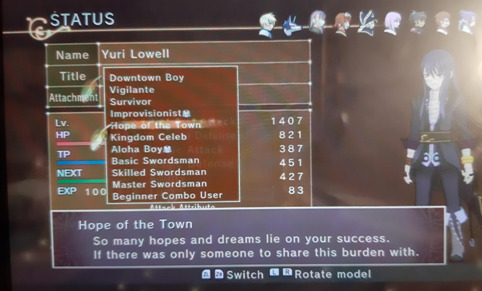
Yuri's flavor text: "So many hopes and dreams lie on your success. If there was only someone to share this burden with."
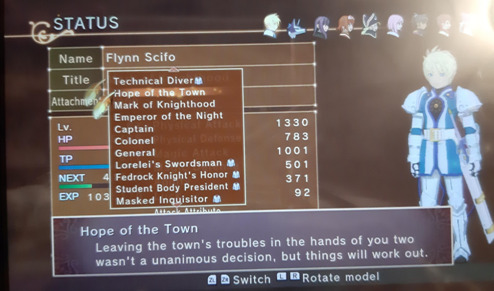
Flynn's flavor text: "Leaving the town's troubles in the hands of you two wasn't a(n) unanimous decision, but things will work out."
Now, at first glance, I didn't notice anything off with the texts here, as they match, somewhat. Albeit, Yuri's would seem an odd choice, as if a certain someone wasn't there the entire scene? Flynn certainly wasn't there in the xbox 360 version. And Yuri's title's flavor text has not been touched since 2008. Flynn's is fine as is, as it's part of the text that was translated for the definitive edition.
What many players wouldn't know (unless they played with Japanese text), is that Yuri's title received an update in the PS3 version!

This is once again from the fan translation website I love to reference when looking for information. Note that the option for Japanese and English text side-by-side is comparing the Japanese script with the fan translation.
Here is the text from the screenshot:
下町の希望1/2 街の希望は2人で担えば、苦しさは半分こ、 もたらす喜びは2倍のお得な相乗効果
Sharer of Hopes With the two of you sharing the town's hopes, your burden is halved, but you bring double the happiness!
And for the sake of having it all in one place, here is Flynn's:

下町の希望1/2 街の悩みは2人で担えば、いつも意見が対立する。 それでも出た答えは、下町に希望を与えるそんな二人
Sharer of Hopes Leaving the town's worries in both your hands may cause some squabbling, but the result is always for the best.
Does this mean there is possibly more text that may have share the same fate as Yuri's title? Possibly. For all my time spent on Vesperia inside and outside the game, I never fully dabbled seeing all of the 2008 version had to offer, nor am I good enough in Japanese to play the game in it and find differences myself. Does it make me wish that Bamco did better with the translation of such a popular tales title? Yes, of course. Oh my god.
Thanks for reading!
#tales of vesperia#yuri lowell#flynn scifo#only tagging them as it's relevant to their titles in game#woe tovposting be upon ye#i spent an embarrassing amount of time looking for the 360 version of the claiomh solais scene just to see if there was any other change
12 notes
·
View notes
Note
Speaking of translation (t.y. for the opening anon), I'm curious of the closest true in-context translation of this panel (ch.3), bcoz there're 2 version with completely different tone.
And do you know how to learn the meaning of Japanese from contexts and affixes like the previous question? Or what level of Japanase will I need to start learning them? (It really grind my gear everytime I learn that some translations from anything got it wrong/different context than the Japanese counterpart)

For the first part: I haven't actually read that bit in Japanese because I picked up the series when I bought volume one from Viz, but I did see that Viz's translation of this didn't match the screencaps floating around at the time, so I asked a friend of mine who works as a JPN > ENG translator.
TL;DR, Viz's translation is better. While the word William used can be used for sex, it has more connotation of letting loose, going wild, having some reckless fun, etc., without referring to any specific actions.
This is not the first time I've seen fan translations in this series lean heavily on sexual meanings of words that aren't really relevant to the situation in which they're used and taking it too seriously.
For the second...
Context is something you need in every language you know and learn. It's something you need even in languages you're fluent in to intuit meaning. For my last post about this, the context was that the prior discussion was that the brothers had been discussing how Louis was so strong and reliable when he had been weaker beforehand and always protected.
Language doesn't mean much of anything without context. Or at least it means a lot less.
As for connotation, you learn it as part of learning the language and seeing how the words are used and what effect they're being used for. This is just something you pick up as you go. Dictionaries with good example sentences can help.
As for affixes...well, I was actually talking about particles, which in Japanese overlap some, but are really very different things. And you cannot learn Japanese without learning particles. They are critical to Japanese grammar and sentence structure. They are the pieces of the sentence that hold everything together and indicate how words in the sentence relate to other words in the sentence. The particles mean Japanese syntax is in general a lot looser than English syntax.
I personally have a handbook of particles to help figure out the various things. I find it helpful. You can also google them, I guess. Wikipedia has a long list of various uses for various particles.
You need to start learning particles like に at the most introductory levels of Japanese, and your understanding of them will grow as your understanding of the grammar does.
11 notes
·
View notes
Note
I find it so interesting that with in the twist universe, the boys write things out in English and not Japanese. For instance, the Valentines Day cards having been written in English as well as the contract in the Octavinelle commercial. It feels very deliberate. As if to indicate that they are foreign and don't necessarily speak the same language, but the writers also want us to still understand what's being written so they write it in English. Idk I just think it's a neat way of depicting this without having to go full Tolkien.
Mmm, that's definitely an interesting topic 🤔 Most fantasy media doesn't go out of its way to invent entirely new languages for its use (I only know of Devil is a Part Timer! doing it). It's actually difficult to come up with an entirely new language; you don't just come up with substitutions for words, but also new meaningful symbols, pronunciations, grammar and syntax which governs how the and sounds, words can be arranged, and social rules for the language's use. It's just easier to use a preexisting language and then to come up with some excuse for why we can understand them (typically because of magic doing the translating for us, or plain old suspension of disbelief). In the case of TWST, I think there's a number of reasons why they decided to utilize English for its writing system:
Firstly! The main setting for the game, Night Raven College, is modelled after a British boarding school and England's education system in general. With such English roots, it only "makes sense" for the characters to also write in English. If we consider that Yana herself is involved with TWST, "English" is also an aesthetic that is very suited to her skillset, especially considering her other very popular work, Black Butler. (She really was a perfect pick for the job, huh?) Secondly! If TWST's intention always was to go international someday (which it has), English is a safe bet to go since it's considered a "global" or "universal" language. Not everyone knows it of course, but it's the closest thing we have to a "common" tongue, as the most people in the world speak it! Thirdly (and this is the big one)! In Japan, TWST's country of origin, English is seen as (for lack of a better term) "aesthetic" and even as a status symbol. One 2020 poll found that less than 30% of the Japanese population speak English at any level, and 2-8% speak English fluently. In other words, most Japanese people would not understand the level of English being used in TWST, from Azul's contracts to the wording on the Great Seven statues and more. (You can sort of get a grasp for how few Japanese people are fluent in English from the Valentine's Day Gifts, which are all written in English; it's the one time of year when Japanese fans behave like EN fans and ask around for translations of the cards rather than the other way around for generalized TWST content.) Now, continuing off the point I made about English being seen as a status symbol... It's typically the highly educated and/or the privileged of Japan that learn English to a fluent degree. Considering that NRC is seen as an elite institution, the fact that its students can fully articulate (ie use full sentences in complex ways) in English only adds to that feeling of "being elite" (at least for the Japanese audience). English also has the effect of making the world of TWST come across as more "foreign" and helps to simulate the "other-worldliness" of the TWST characters in general (again, because of how rare fluent English is in Japan). The effect is somewhat lost in TWST EN, as most things are in English and the material is presented to predominantly English-speaking audiences in the USA and Canada, although I guess you could make the argument that the spoken dialogue staying in Japanese makes up for that lost feeling of the writing seeming foreign.
So!! There's actually many different reasons (or perhaps a combination of all of these, or unintended side-effects of one of them) as to why the general writing system in TWST is English rather than Japanese.
#twst#twisted wonderland#twst en#twisted wonderland en#disney twisted wonderland#notes from the writing raven#Black Butler#Kuroshitsuji#Devil is a Part Timer
88 notes
·
View notes
Note
Here are some questions for my favourite writer. You don’t have to answer all of them, of course!
As a fanfic writer how do you feel when your work gets translated into another language? In what ways do you think it’s different from situations when some well-known book is translated into other languages and such translations are supervised by the publisher? And how would you feel if a longer work of yours got translated? Like Muse or Fireproof.
Thank you for being my inspiration and safe place! Me discovering you earlier this year has literally changed my life.
Happy New Year!
Anon!!!
This is such an absolutely lovely thing to get in my inbox??? :''')
First of all, thank you, really. It always elevates my whole brain chemistry health whenever someone enjoys the stories I tell, so thank you for saying so. The "safe space" comment in particular really humbled me, as well as the life-changing bit. I don't even know what to say except that I'm honored I could provide a feeling like that. I hope you're doing well now, and that you've had a year that made you more resilient than before and kinder to yourself in new ways. <3
For the questions: I love when people ask to translate my work! I only wish I could read the translation as well because everything that goes into it, from word choice to grammar to syntax to humor, fascinates me. I always try an auto-translator to try and get the gist of how they translated certain lines or dialogue, but of course that's not the same thing as having a fluent or native understanding of both languages. Still, it's an incredible feeling knowing that someone would volunteer hours of their time to translating something I wrote. :')
I'm not sure how the translation process works with publishers, but that'd be interesting to find out one day! I do know from interviews that some translators have the opportunity to work closely with the writer as they translate, so that might be a major difference. As it stands now, most of the time I'm just asked permission, and then when it's finished I add the link to the AO3 page. It'd be fun to see the thought process behind those choices, as well as learn some interesting things about some new languages. :)
Oh, god, MUSE would be a nightmare to translate just because of the length. My friend Rachel is in the midst of podficcing it and even that's a gargantuan undertaking, and that's just the narration side! Translating would take twice as long, I feel??? I'd be blown away if anyone ever did it. Fireproof wouldn't be as bad, but man, I've translated short Japanese fics into English before and that took ages, so I just have enormous respect for translators.
Happy New Year, Anon! :')
Thank you for sending me something so interesting to ponder, and for making me smile first thing in 2024. <3
2 notes
·
View notes
Text
genuinely pissed off how much easier learning Spanish is than Japanese. I put years of my life and literally tens of college hours into learning Japanese, paid thousands of dollars for it, and now I don't practice it and I was never as good at it as I am at Spanish now, after like not even 2 months?????????
I was on like chapter 3 of Spanish Duolingo (don't @ me it's free) and I realized oh the adjective order is different but you can literally replace almost every bit of the sentence for an English word, this grammar and syntax is completely familiar. and I proceeded to keep doing Spanish for several hours because it was just so goddamn easy to learn. it's a puzzle. it's a code. it's a very fun accent. Japanese is all of those things except four times harder.
it's not a surprise to anyone and that includes me but it is just frustrating. why is it the language I have a leg up on due to being taught fragments of it in elementary school and it being printed on the packages I buy and me picking up the accent from people at my job not the language I cared passionately about as a teenager.
1 note
·
View note
Note
Would it be spoilers to ask why was Alvaro's Spanish not translated by the magic the same way his English was?
It wouldn't be spoilers at all - as a matter of fact, I was kind of hoping it'd come up eventually!
although i will be putting this under a cut because it turned out longer than expected oops
So in case anyone was wondering, I've actually been going by the language headcanons found in Lost in Translation by Broken_Synchronicity (a really good fic I highly recommend it) - along with the fact that (at least until Port Fest cries) there didn't seem to be any real mention of Spanish culture. Again, at least from what I could see - maybe I just missed something lol
So it gave me the idea of Spanish just not being a language in Twisted Wonderland. Then I learned from the novel that there's apparently been a translation spell of sorts going on for at least the novel's version of Yuu, allowing them to understand and communicate with the people of Twisted Wonderland. And so, I combined the two!
Spanish as a language does not exist in Twisted Wonderland, and English just barely does in the form of a dead language. The most commonly spoken language is the equivalent of Japanese, which notably, Alvaro cannot speak. So, the universe throws him a bone in the form of that translation spell.
And here's where the question is finally answered instead of just my rambling - since English technically exists in Twisted Wonderland, the spell is able to work off of it and translate it easily into Japanese that the people of Twisted Wonderland hear - and vice versa with the spell translating their Japanese into English for Alvaro, since that's the language he speaks the most. However, since Spanish doesn't exist as a language, the translation spell has nothing to work off of. Think of it as trying to translate for a language you both don't understand and don't have a reference for, into a language with wildly different grammar and syntax. So it does its best by first trying to convert the Spanish into a similar sounding language - which in this case, would be Italian - before translating it into Japanese. Nevermind that even that has its flaws, shown with how the translated Spanish comes out sounding like extremely broken and butchered Japanese.
There is another caveat to the translation spell, in that it depends somewhat on Alvaro's focus. When he's not really thinking too hard about what language he's speaking, it translates smoothly into Japanese for him (or as smoothly as it can be when he's speaking Spanish). However, if he's focusing on what language he's speaking - or even writing - it can't translate at all, due to Alvaro's own thoughts disrupting the spell. This goes the same for writing and reading, something Alvaro takes advantage of when he writes in his notebook. It's very annoying when it comes to reading though, since if Alvaro thinks too hard about what he's reading, he'll start seeing Japanese instead of English and have to stop before he's able to continue.
As a note, any text Alvaro writes in either English or Spanish when he's purposely thinking about writing in them stay in that language - the translation spell doesn't change them since Alvaro can already read it, and no one else has this spell cast on them. On top of that, though it has the capability to translate other languages into English for Alvaro, it focuses on translating just Japanese. If he really focused, he could try and translate other languages, though he has yet to find it worth the time.
Tldr; there is a translation spell Alvaro had cast on him when he first arrived in Twisted Wonderland, that allows him to talk to other people and read and write without drawing any suspicion to himself. This spell is disrupted whenever Alvaro purposely thinks about the language he's speaking/reading/writing with. When it comes to Spanish, since there is no basis for the language for the translation spell to work on, it tries its best to translate it first to Italian (the closest equivalent it has) and then to Japanese (the common language), resulting in very wonky and broken-sounding translations.
#answered#twisted wonderland#anonymous#wonderin and wonderin#Avoiding Twists and Turns#Alvaro Cervantes#thanks for the ask anon! i've actually been dying to talk about this in detail sfjsdlkf#i'm not entirely sure if it all makes sense but this is what i got!#yeah the port fest event really threw me off because FUCK CHURROS EXIST WHICH MEANS THERE'S A POTENTIAL SPANISH SOMEWHERE#and now i'm just gonna pretend another country made it that isn't at all spanish#mostly because i don't actually know the context entirely yet kdfjlksfdj#but yeah Alvaro's very observant for managing to notice that#that though he heard english they weren't speaking english#he really has to focus when writing in spanish or english on purpose though#because if his mind starts drifting while he writes#he's gonna look back down and realize it got automatically translated to Japanese which he's now gonna have to go back and erase and redo#similarily he's gotta find that balance between focusing and not during school lessons#because fucking rip if he turns in an assignment written in a dead language LMFAO#i'm so sorry about the ramble this became but also No I'm Not
22 notes
·
View notes